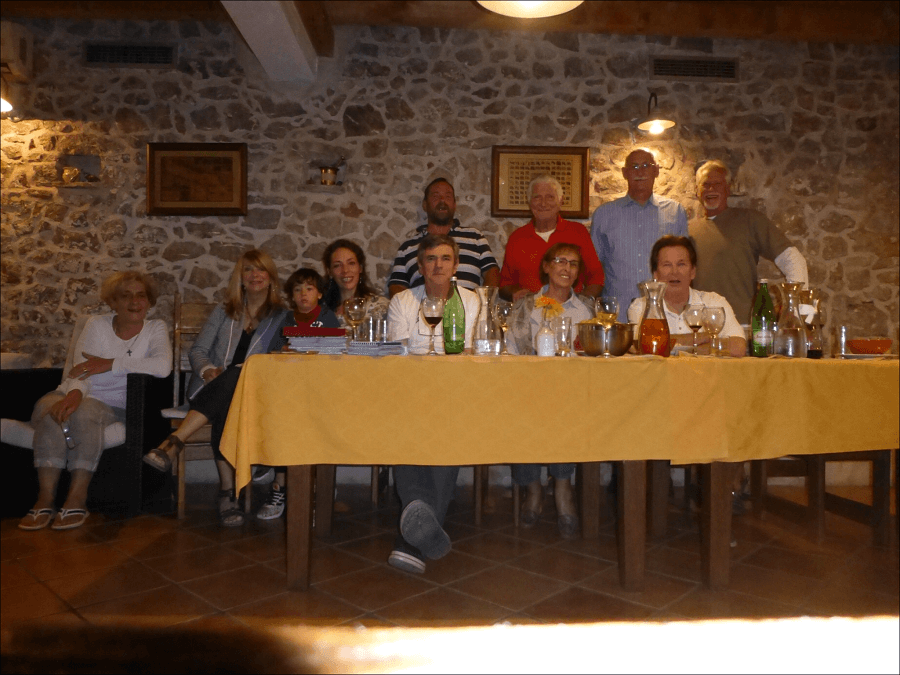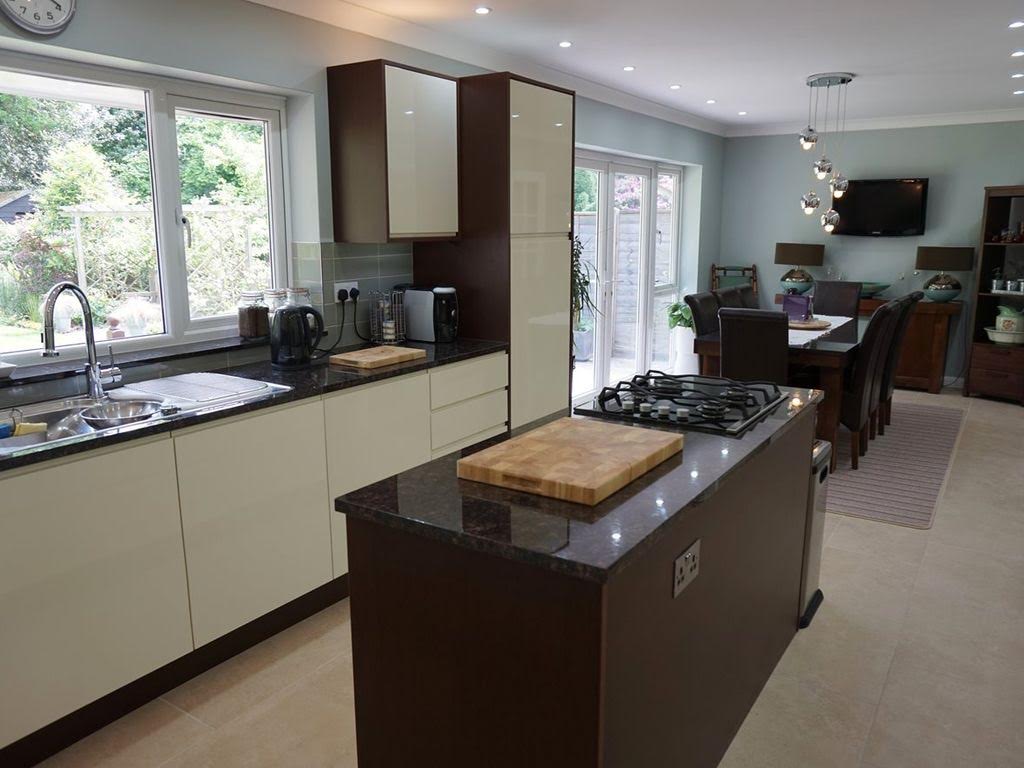Croatian Returnee Reflections: Phil Vrankovich, from California to Hvar
October 4, 2022 - Whisper it quietly, but more and more people are relocating to Croatia from the diaspora. In a new TCN series, we meet them to find out how they are faring and what advice they have for others thinking of making the switch. Next up is Phil Vrankovich, who moved from California to Hvar.
My name is Philip Vrankovich, and I am presently retired after 30 years in the IT side of the energy business. I was born in Oakland, California. My connection to Croatia is through my paternal grandparents, Antun Vranković and Bona Dobrosić, both from the village of Svirće on the island of Hvar. They immigrated to America at the turn of the 1900s.
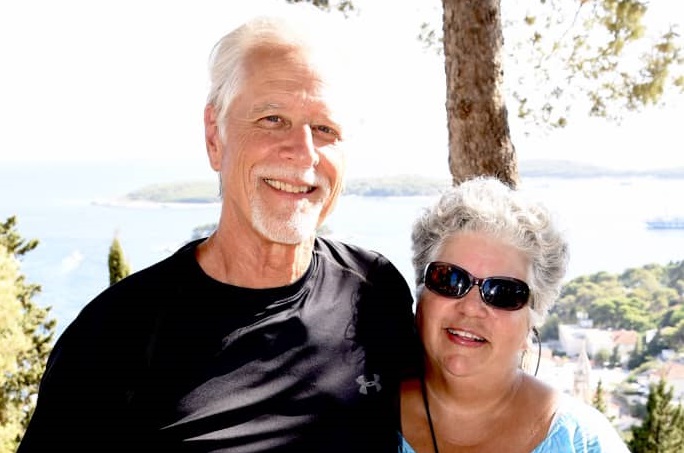
1. You made the switch to Croatia. Tell us a little about the decision process and how long it took for you to get on the plane.
I had always talked about going to Croatia, starting in the 1980s, but didn’t actually make it there until 2000. In July, 2000, we made a family trip to Hvar to meet family members I had only heard about. We arrived at the Stari Grad port to our cousins waving Croatian and American flags in the parking lot. It still gives me chills recalling that experience. My wife, Vicki, and I returned in 2001 to purchase property in Vrboska, with the intent of retiring on the island. In 2006, we made that dream come true, when we purchased a house in the now UNESCO-protected town of Stari Grad. I also became a Croatian citizen in 2010. We’ve made Hvar our home for 6 months out of the year, spending the rest of the time in California and now Connecticut.
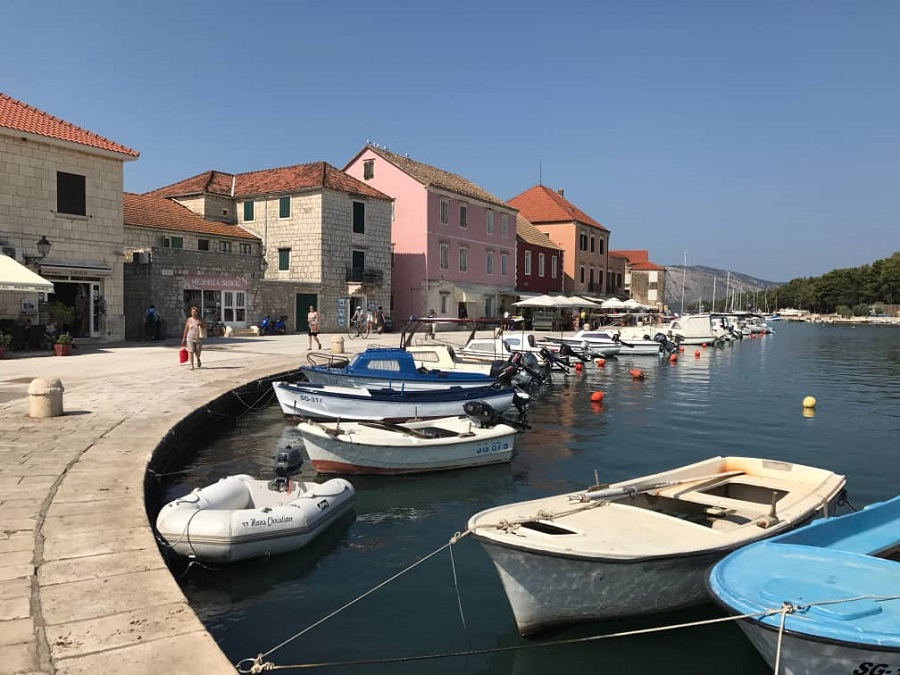
2. What did your family and community back home think of your decision at the time?
Family and friends have been very supportive of our decision to make Hvar our second home, and of course, many have come to visit over the years.
3. Where did you get your information about the realities of Croatia prior to coming?
Since I had family who came from Dalmatia, I had resources in America who helped to tell us about what to expect; however, that was no replacement for actually being here - in reality, it was so much more beautiful than I had imagined!
My godmother and her two daughters helped us arrange to meet family members, as well as their families, on our first trip in July 2000.
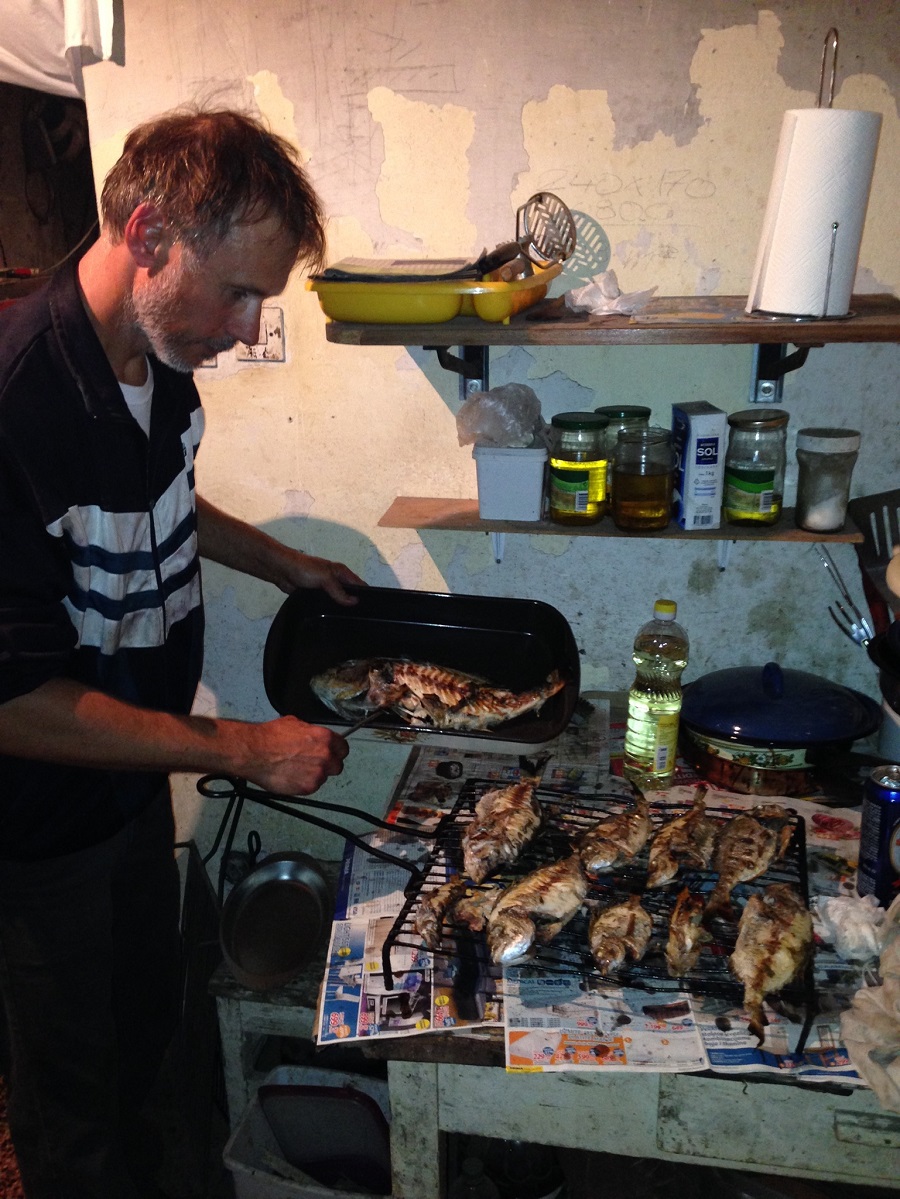
4. What were you most nervous about making the switch? What was your biggest fear, and what was the reality of what you found?
Really, we had no reservations about making a switch to living on Hvar. We had family here, made some friends, both domestic and expatriate, and felt welcomed. Initially, I thought the language difference would be an issue, but we found many people spoke English and those that didn’t, we were able to use our limited Hrvatski, sign language and pantomime in order to communicate
5. Think back to the time before you arrived. What were your perceptions about Croatia, and how were they different from the reality you encountered?
My parents and sister visited Hvar in the mid-1970s, and of course, it was much more primitive then. I remember my father saying there was no air conditioning, few autos and that you couldn’t get ice at a bar. He questioned why we would want to live there… of course, when we arrived, it was decades later, and things had changed here. I recall asking, “why did my grandparents ever leave, this place is so beautiful!” However, life in the late 1800s was very different here. When they married, it was two brothers who married 2 sisters, and there were not enough resources for both pairs to stay there. So my grandparents made the move to America.
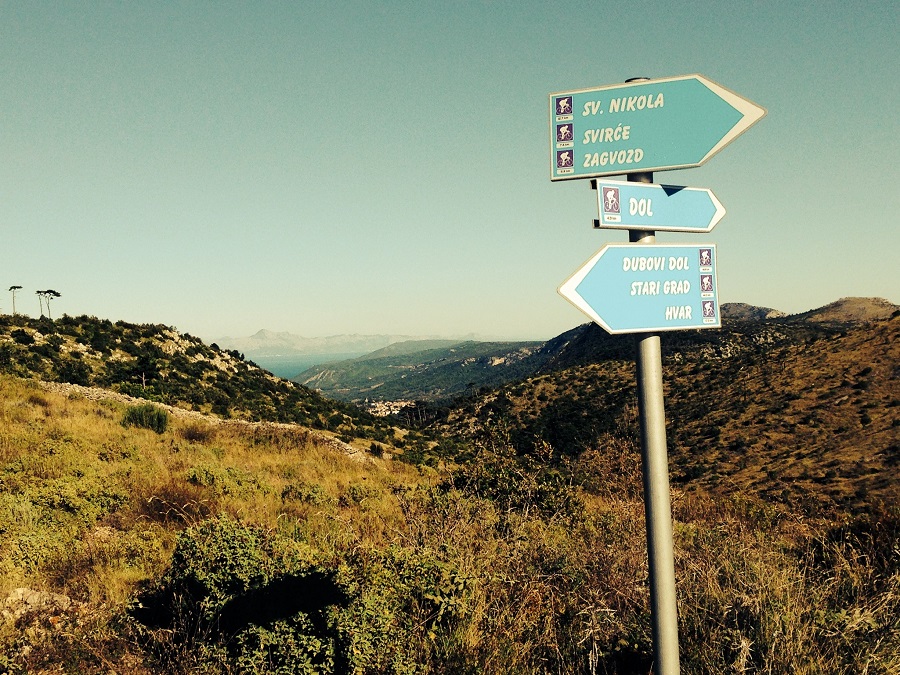
6. You are still here, so obviously, the pros outweigh the cons. Tell us about some of the things that you love about being in Croatia, as well as some of the things you don't like.
We love the island life, “polako,” the family and friends we have met here, and of course, the culture, food, history, and environment (sea, mountains, and the climate). It’s difficult to put into words the feeling of visiting the house my grandmother was born in or planting grape vines in a field where my great-grandfather once toiled… it’s very special!
For the cons, the bureaucracy of getting anything done here is frustrating, and trying to learn Hrvatski is difficult (grandmother and father always spoke to me in English… I guess they never conceived any of us ever going back), especially with so many people here speaking English, and missing immediate family and the variety of food available back in America.
7. What advice do you have for others thinking about making a move from the diaspora?
Follow your dreams! Visit, and live in one place for a period of time to experience the community. See if it really fits your lifestyle. Don’t be disappointed and frustrated when things don’t turn out exactly as you expected, instead embrace the differences and go with the flow.
8. How do you think Croatia can better assist those who are looking to return to the Homeland?
Make becoming a Croatian citizen a streamlined process, and afford all family members of returning Croatians the same level of respect under the law. For example, during Covid, my Croatian passport expired in 2020, and my wife’s residency card expired in 2021, yet they allowed me to renew my passport but told her she must start the entire process all over again! Why is it that my wife can’t become a citizen simply by the fact that she is married to a Croatian? Instead, she must go through the process of being a temporary resident for many years.
****
Thanks, Phil!
You can follow more stories in the Croatian Returnee Reflections series in our dedicated TCN section.
Would you like your returnee story - positive or negative - to be featured in this series? Contact This email address is being protected from spambots. You need JavaScript enabled to view it. Subject Returnee.
****
What's it like living in Croatia, and where can you get the best survival tips? TCN CEO Paul Bradbury and TCN Editor Lauren Simmonds have teamed up to publish Croatia, a Survival Kit for Foreigners.
Follow Paul Bradbury on LinkedIn.

SuperSport HNL Round 11: Hajduk Takes 3 Points Against Rijeka, Dinamo's Winning Streak Continues
October 3, 2022 - The 11th round of the SuperSport HNL was played from September 30 to October 2, 2022. This round saw Dinamo take another 3 points, while Hajduk secured a crucial win against Rijeka to remain in 2nd place. Osijek, however, is just two points behind Hajduk in 3rd. Here is our SuperSport HNL round 11 recap.
Varazdin v. Istra 1961 (1:1)
Varazdin and Istra opened the 11th round on Friday, September 30, 2022, in Varazdin in front of 1,593 fans.
Teklic put Varazdin ahead in the 37th minute for 1:0 before Caseres equalized for the final 1:1 in the 69th minute.
Varazdin is in 5th place with 16 points, while Istra is in 6th with 13.
(No video available)
Osijek v. Lokomotiva (4:1)
Osijek and Lokomotiva met on Saturday, October 1, 2022, at City Garden Stadium in Osijek.
The Slavonian club nearly confirmed the winner in the first half with goals by Barisic and Beljo in the 2nd and 3rd minutes for 2:0. Caktas increased their lead to 3:0 in the 45th minute. And Osijek wasn't done scoring yet, as Kleinheisler made it 4:0 with 10 minutes to go. Finally, Vasilj got one goal for Lokomotiva in the 86th minute for the final 4:1.
Osijek has now moved into 3rd place with 18 points, while Lokomotiva is in 8th place with 9 points.
Dinamo v. Slaven Belupo (4:1)
Dinamo and Belupo met at Maksimir on Saturday, October 1, 2022.
Dinamo took the lead in the 9th minute thanks to an own goal by Markovic for 1:0. Hoxha equalized for 1:1 in the 60th minute, but that only woke Diamo up. Petkovic scored a penalty for 2:1 in the 72nd minute, Bockaj made it 3:1 in the 81st, and Ivansuec secured the 4:1 victory in the 3rd minute of stoppage time.
Dinamo is currently having the best start to the season in the club's history, sitting in first place with 31 points. Belupo is in 4th place with 17.
Rijeka v. Hajduk (0:1)
Rijeka and Hajduk met on Sunday, October 2, 2022, at Rujevica Stadium.
The first half went without a goal, and Rijeka looked much more aggressive than they did just a few weeks ago against Hajduk at Poljud. Awaziem scored for Hajduk at the beginning of the second half, making it 0:1 in the 51st minute, which was the final score.
Rijeka remains in the last place with 6 points, while Hajduk sits in 2nd with 20 points and a game in hand.
Sibenik v. Gorica (1:1)
Sibenik and Gorica closed out the 11th round in Sibenik on Sunday, October 2, 2022.
Fruk scored for 0:1 Gorica in the 38th minute. Prsir received his second yellow in the 55th minute, forcing Gorica to play with a man down for the remainder of the match. But it didn't take long for Sibenik to suffer the same fate, and Arai was booked for his second yellow in the 73rd. Delic scored a penalty to equalize at 1:1 in the 82nd minute. Gorica ended the match with nine men on the pitch as Julardzija was sent off or his second yellow in the 1st minute of stoppage time.
Sibenik is currently in 7th place with 11 points, while Gorica is in 9th with 6 and a game in hand.
(No video available)
You can see the full HNL table HERE.
To follow the latest sports news in Croatia, follow TCN's dedicated page.
Croatian Arable Land Prices Increase Significantly in Short Time
October the 3rd, 2022 - Croatian arable land is yet another thing that has seen its worth massively increase in a relatively short space of time. While property of all kinds across the country has seen price hikes, the price per hectare of arable land has done quite the leap.
As Poslovni Dnevnik writes, the average price of purchased Croatian arable land last year stood at 27,595 kuna per hectare, which is 1,665 kuna more than it was the year before, according to data from the State Statistics Office (DZS) published on Wednesday.
The aforementioned statistics also show that back in 2021, the average price of purchased meadows was 18,204 kuna per hectare, which is 915 kuna more than it was the year before, and pastures costed 18,516 kuna or 2,865 kuna more.
In Pannonian Croatia, the average price of purchased arable land was 27,869 kuna, meadows came with a price tag of 19,276 kuna, and pastures totalled 11,557 kuna per hectare. Compared to just one year before, the average price for the purchase of Croatian arable land increased by 1,453 kuna, meadows by 408 kuna and pastures by 837 kuna per hectare.
The average price of purchased arable land in the Adriatic part of Croatia stood at 40,793 kuna per hectare, which is 7,153 kuna per hectare more than it was back in 2020, meadows came with a price tag of 16,456 kuna or 2,499 kuna more, and pastures were 25,313 kuna per hectare or 4,890 kuna more than they were sold for back in 2020.
In Northern Croatia, the average price of arable land was once 23,872 kuna per hectare, meadows costed 19,021 kuna, and pastures came at a price of 17,111 kuna per hectare. As such, the average purchase price of Croatian arable land was 1,354 kuna more, meadows were 40 kuna more and pastures had seen an increase of 125 kuna per hectare.
For more, make sure to check out our dedicated business section for more on Croatian land and property prices.
Sabine Engelhardt Chooses Brac Agriculture over Architecture
October the 3rd, 2022 - Sabine Engelhardt is a German architect who came to live in Croatia thirteen years ago, choosing the Central Dalmatian island of Brac as her home on which she switched her life of architecture for a life of agriculture.
As Morski/Blanka Kufner writes, Sabine Engelhardt is the owner of the eco estate Gea Viva which has been entirely designed according to permaculture principles. Her goal in life is not to use more than the planet can handle and she imagines the future of the world we live in as a multitude of small but strong local communities where people live self-sustainably.
The German national who moved to Croatia thirteen years ago is an architect and carpenter by profession, and while she had some level of contact with agriculture in her childhood, she never went on to have any sort of employment in it as an adult. She considers it illogical that in Germany, for example, they save on food, which is essential for health, and spend an awful lot of money on cars. For years she worked as an architect in Great Britain, but at one point she felt a strong need for change and decided to create her new life near Milna on the island of Brac, Agroklub writes.
The permaculture way of life has been attractive to her for a long time because the planet we live on is important to her, and she was also involved in eco-architecture. Her main idea was to organise a meeting place for people who think in a similar way, and agriculture, she says, somehow developed along the way.
''Permaculture is very close to the traditional approach to agriculture because it encourages a variety of plants, working with your hands, and a circular economy. Some things are more modern, others are very close to the traditional way of life,'' Sabine Engelhardt explained, readily admitting that agriculture on Brac is a challenge.
Since there's no connection to the water supply, you can't really base much on the production of vegetables, but there are plenty of fig trees and other fruit trees that she planted, as well as 180 olive trees. She realised that it is more profitable for her to produce olive brine than olive oil, and she also creates massage oils, macerates, creams, salves and soaps. On her family farm (OPG), which spans a little more than one hectare, he has various medicinal plants from which she makes things.
''The immortelle one is excellent for injuries and burns, and the mint one it great for neck massages,'' she revealed. As an interesting product, she pointed out a mixture of dry herbs that are lit for a pleasant smell in the home. It is particularly important for her that consumers become aware of how much power they do actually have and that it is important what they choose to spend their cash on, and she strongly advocates for supporting local producers.
''It's important for me to be able to spend time out in nature, not in the office. It's a great asset to be able to organise your day as you wish, even though there is a lot of work to do,'' said Sabine, admitting that it isn't easy because she has to take care of several animals - a donkey, chickens, a dog and a cat, and all of the plants, so she can't "just go somewhere".
Regardless of the many obligations and the great effort invested, Sabine Engelhardt says that the satisfaction she gets from creating her own products is far more valuable than anything else. This year, she had a lot of figs and tomatoes, but the potatoes were a complete failure. She added that this year she grew lentils for the first time, struggled with peeling them, and in the end only got five tablespoons. However, with a smile, her quinces produce well almost every season. She doesn't earn much from farming, she gets a little more from the campsite she runs and the events it offers. She doesn't lead a luxurious life and constantly needs to invest more and more.
She likes life in Dalmatia, as well as the fact that people here know how to enjoy the little things. When she first arrived on the island, there were still plenty of people who could pass on knowledge about traditional agriculture to her and she regrets that young people mostly run away from agriculture because there are fewer and fewer old people with experience to gain wisdom from.
Sabine also resents how absolutely everything is aimed at tourism, and the construction of yet another new resort is also planned near her property.
''I feel that big changes are coming and that people will need to focus more on food production and self-sustainability,'' concluded Sabine Engelhardt.
For more, make sure to check out our dedicated lifestyle section.
Another Archaeological Find Takes Us Back to Roman Rule Over Istria
October the 3rd, 2022 - There are frequent archaeological finds all over Croatia, with most of them involving the Roman Empire being discovered in Dalmatia. One such find is yet another in a series of impressive relics which transport us back to the time of Roman rule over Istria.
As Morski writes, an impressive archaeological find was discovered down on the seabed of Barbariga bay in Istria recently. A large Roman pier, almost 60 metres long, where two thousand years ago some of the best olive oils of the Roman Empire was loaded up has been unearthed.
The sea always hides many stories both on the surface and below it, and this one in particular is a story that takes us straight back to the time when Istria was ruled by the ancient Romans.
Ida Koncani Uhac, head of the underwater archeology collection from the Archaeological Museum of Istria, said that they are investigating a Roman jetty in Barbariga bay, and at a depth of a mere three metres, archaeologists found a monumental structure - the aforementioned almost 60-metre-long Roman pier constructed with three rows of stone blocks.
''We as divers are here to help the archaeologists in their work and to take care of the safety of diving because diving needs to be done in pairs. This is the rule in diving,'' said Sandra Kamerla Buljic, a local diving instructor. This particular dive takes us back two thousand years, to the times of the mighty Roman Empire, and when the sea level was a full two metres lower than it is today
''Back during that time, one of the largest oil mills in the entire Roman Empire was located on the coast, and there were also impressive villas and a large jetty as part of the commercial port. There were no roads, and maritime traffic dominated. These ships would dock and load up the olive oil, which Pliny the Elder wrote was the second best in quality in the entire Empire, and it was then transported in amphorae.
These amphorae were produced in Fazana, also in Istria, and they were then transported to the pier. This is where oil was stored and then shipped on, mainly to the Northern Adriatic, to Aquileia, the river port of Aquileia and further inland to supply the Roman army that guarded the borders of Histria,'' explained Koncani Uhac.
Discovering a story that was forgotten for thousands of years is the job of archaeologists, and Dolores Matika, an archaeologist, stated that they are interested in whether any seeds and fruits have been preserved. More will be known after they conduct further research into these findings, but given the fact that they have found olive pits, they expect satisfactory results in this regard.
Remains of amphorae, dishes, glass and ceramics have already been found, and Koncani Uhac has claimed that they also found an interesting bowl that they managed to date to the period 15-25 years after Christ.
The research is being carried out as part of the "Istrian Undersea" project, in which as many as seventeen diving clubs are participating. All of them are exploring their areas in search of archaeological traces, and ancient remains of Roman ports have been found throughout Istria, as HRT reported.
For more, make sure to check out our dedicated lifestyle section.
Croatian Ski Holidays Still Being Booked Despite Inflationary Pressures
October the 3rd, 2022 - Croatian ski holidays are still very much on the radar for many skiers hoping to hit the slopes despite inflationary pressures and rising prices putting a dampener on most other things.
As Poslovni Dnevnik/Marija Crnjak writes, Croatian ski holidays are at the forefront of the minds of those who ski annually. The skiing season is more or less just around the corner and will now finally not have any coronavirus and demand issues, but a new big challenge has arrived at the doors of European ski resorts, the high cost of energy, which is a significant resource in this segment of tourism.
The result is an average 10 to 20 percent increase in prices for skiing holidays, with certain savings measures that will be applied at many ski resorts across Europe, and those that have invested in sustainable technologies and alternative energy sources in previous years will fare best.
Croatian agencies are already recording a significant increase in bookings for skiing holidays compared to the previous two pandemic-dominated years, and for some, the number of bookings so far has even exceeded those from back in pre-pandemic 2019.
Boris Zgomba from Uniline explained that they have as many as three times more bookings for Croatian ski holidays than they had back during this period in 2019.
"This, of course, doesn't mean that we'll actually manage to achieve three times more traffic, that remains to be seen, but we have noticed that, as was the case with the summer, people are tired of waiting around and procrastinating, and they can't wait to get back to the snow and engage in what they've been creating and enjoying for years now. They're also ready for the fact that there will be higher prices, which have risen even less than, say, the prices of hotel services in Croatia this summer. This desire to return to skiing may have resulted in them booking earlier," says Boris Zgomba.
At the same time, Uniline has an offer at the level of 2019, that is, there are no indications that there are fewer service providers active than before the pandemic, despite challenges with a lack of workers, inflation and continually rising costs.
Dalibor Canaglic from the Palma agency also stated that the interest in Croatian ski holidays is very good, that it is at the level of 2019, with prices higher by an average of 10-20 percent. Families with children mostly opt for the week of January 7-14, when the prices are significantly cheaper than the week before and in February, when all of Croatia's neighbouring countries also have school holidays.
Canaglic noted that ski tickets have become more expensive, and it happens that partners send them ticket price changes due to the increase in energy costs. The price of energy is also a very hot topic in all European ski resorts as it regards everything, from starting ski lifts to producing artificial snow, managing the slopes and heating all of the buildings at sub-zero temperatures, these are all essential items for ski resorts and they all consume enormous amounts of energy.
Therefore, various savings measures are being considered, from limiting snow production, reducing cable car traffic in less busy parts of the day, and limiting the number of gondolas and their working hours. Some have even announced the introduction of only cold water in toilets, lower heating temperatures in closed spaces, and turning off advertising lights and heaters. This will reduce costs, but could also reduce the level of comfort for tourists.
The situation differs somewhat depending on the destination. Although Austrian operators are thinking about appropriate savings measures, their cable cars don't really consume a lot of electricity, and they hardly need gas at all because they have been investing in energy-efficient systems for years. Resorts in Tyrol have revealed to PlanetSki magazine that they will be able to reduce their energy consumption by 10 percent by operating fewer lifts and eliminating night skiing that requires searchlights.
An increase in the price of ski passes is also expected. The example of the ski resort Ski Welt in Tirol is worth noting, as it is the first ski resort whose ski lift has been powered 100 percent by solar energy since back in 2008. While French ski resorts are worried about the rise in electricity prices, there is an example of the Serre Chevalier ski resort in the southern French Alps, which set itself the goal of producing 30 percent of its own energy consumption by 2023 back in 2006. Now that goal has been achieved and it is the first and only ski resort in the world that simultaneously uses three alternative energy sources, hydroelectric power, solar panels and small wind turbines. During the winter and summer season, when the ski resort is open, the generated electricity is consumed immediately, and during the off-season, the surplus is sold back to the national grid.
For more, make sure to check out our dedicated travel section.
Croatian Returnee Reflections: Katarina Bucic, from Toronto to Zadar
October 3, 2022 - Whisper it quietly, but more and more people are relocating to Croatia from the diaspora. In a new TCN series, we meet them to find out how they are faring and what advice they have for others thinking of making the switch. Next up is Katarina Bucic, who moved from Toronto to Zadar.
My name is Katarina Bučić; I was born and raised in the Greater Toronto Area. I lived in Canada with my parents, who moved to Toronto 30+ years ago from Posušje, Hercegovina, and my 4 brothers for 27 years. I worked as a Registered Massage Therapist in the city and was starting to grow tired of its fast-paced and high-stress energy. After I got married to my husband Josip Bučić in 2016, we decided to move out of the city to slow down life a bit and take our first trip to Croatia together as a married couple, my first time visiting in 12 years. I was so eager to revisit my family and soak in my heritage as I was always raised to be a proud Croatian in a multicultural country and to be connected to my roots.
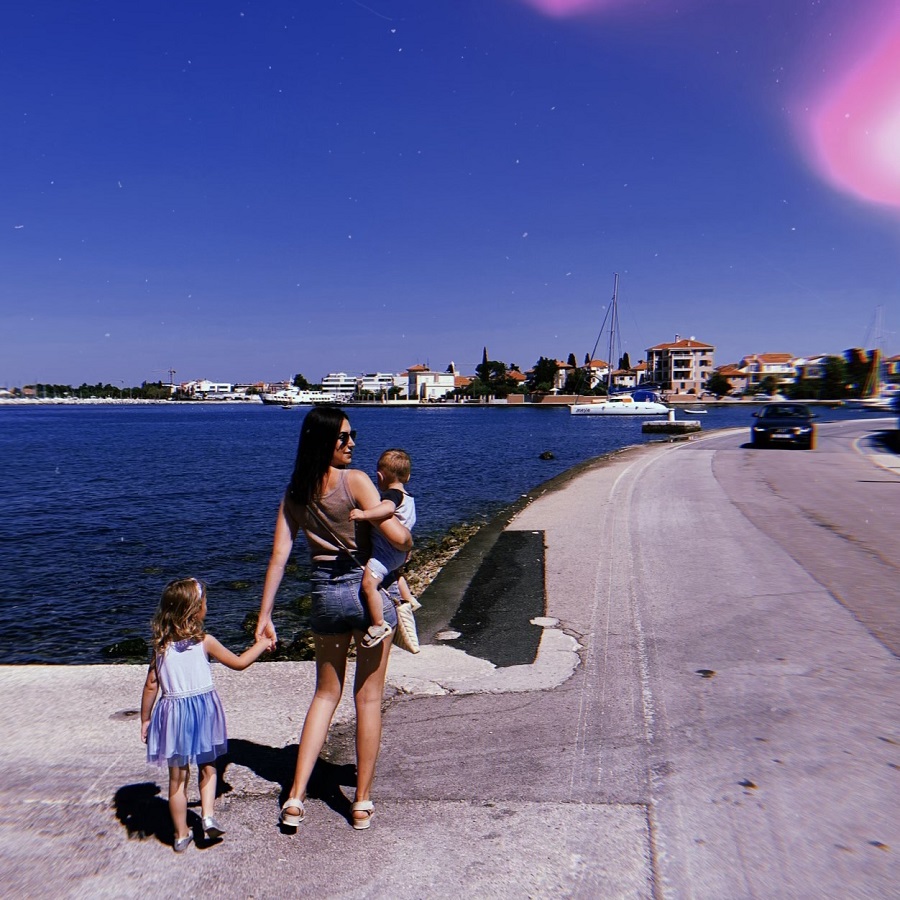
1. You made the switch to Croatia. Tell us a little about the decision process and how long it took for you to get on the plane.
The summer vacation my husband and I took together in 2017 was the catalyst for us returning to Croatia one day. My husband's family is from Zadar, and so we spent most of our time there. It did not take me long to fall head over heels in love with Zadar as a city! The beauty, the ancient walls, and the cobblestone streets. The beaches, the sunrises, and the sunsets on the water. The fresh air, fresh food, and moments are created around the dinner table. The slow pace, the laid-back attitude, and the social culture. I can go on for ages about the magic I felt that summer. The entire trip, my husband and I spoke about the Croatian lifestyle and how different it was from our lives back in Canada. We fell in love with Zadar so much that I said if I were ever to have a daughter, we would name her Zara.
When we arrived back in Canada, we both fell into a sort of funk. We really tried to hold onto the energy and vibe of Croatia once we returned to Canada, but it just wasn’t the same. For years following that trip we talked about our dream of moving back to Croatia someday. There were many game plans, pros and cons lists, and bouncing ideas off of our family and friends. Many people didn’t think too much of our conversations because they always assumed it was just a ” one-day” type of dream, but they didn’t know how we felt that summer in Croatia and how we craved that feeling ever since we left. One evening during pillow talk with my husband Josip, having our 1000th conversation about dreaming to move to Croatia, I had finally had enough. ”You know what?! I am tired of talking about this over and over again. Are we going to do this or what?! Let’s decide right now, you and I, should we chase this dream of ours?” Josip looked over at me with a big smile and said,” Let’s do it!!!”. The next day when he returned from work, I said,” Guess what, babe? I bought us one-way tickets. We are moving to Croatia in 2 weeks.” He nearly fell to the floor. Just like that, Josip, my daughter Zara and I were heading on a new adventure!
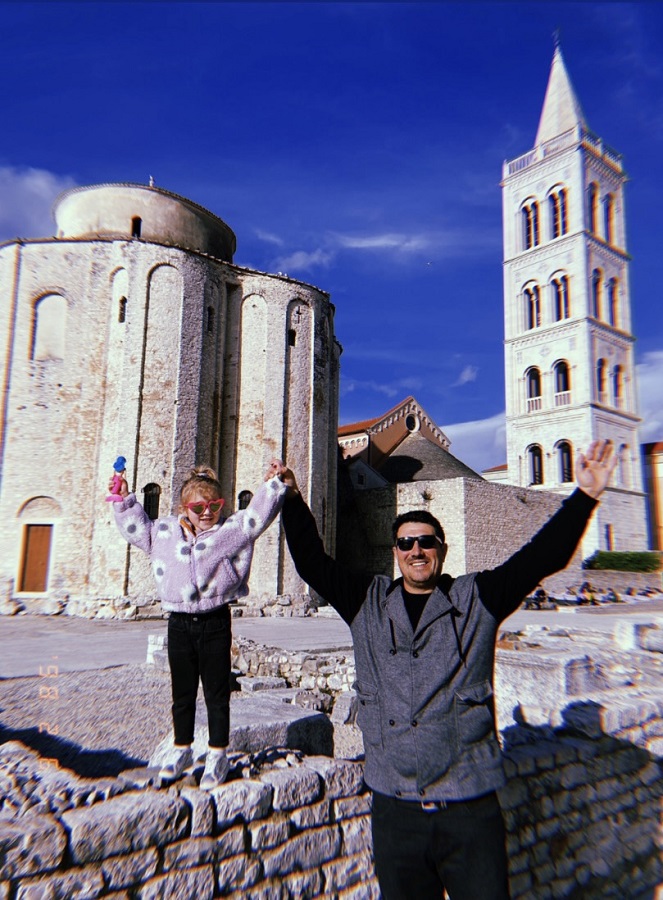
2. What did your family and community back home think of your decision at the time?
As I had mentioned earlier, our family and friends have heard us dream about moving back for years, but I don’t think anyone thought we would actually do it. Once everyone found out that we had actually purchased one-way tickets, the support had an undertone of sadness. Some people thought what we were doing was the most exciting and inspiring act, others thought we were complete morons and doomed, and those closest to us we so happy for us but sad that we were leaving. In all honesty, I feel like many of our friends in the Croatian community have always dreamt about moving back but had self-limiting beliefs. I think they were hoping for us to fail so that they could reassure themselves that their dream is not attainable. It was quite discouraging to hear comments like ”I’ll see you back here in a year” or ”What are you going to do over there? You know there is no work, right? Even if you find work, nobody will pay you reliably” and the most popular from the women ”You know they treat women poorly there right? Josip will change, and your marriage will suffer”.
3. Where did you get your information about the realities of Croatia prior to coming?
I supposed we did not do too much research. We did not know any people close to us who have made a move as well, so we didn’t have anyone to ask for their personal experiences. We knew that we would be applying for residency and citizenship upon arrival, so we came prepared with all of our Canadian documents and had them certified and translated. The rest of our perception of reality in Croatia was based on our summer there in 2017. Josip and I were on the same page about what we wanted out of life and what we wanted our lifestyle to look like, and we were both sure that Croatia could provide that for us.
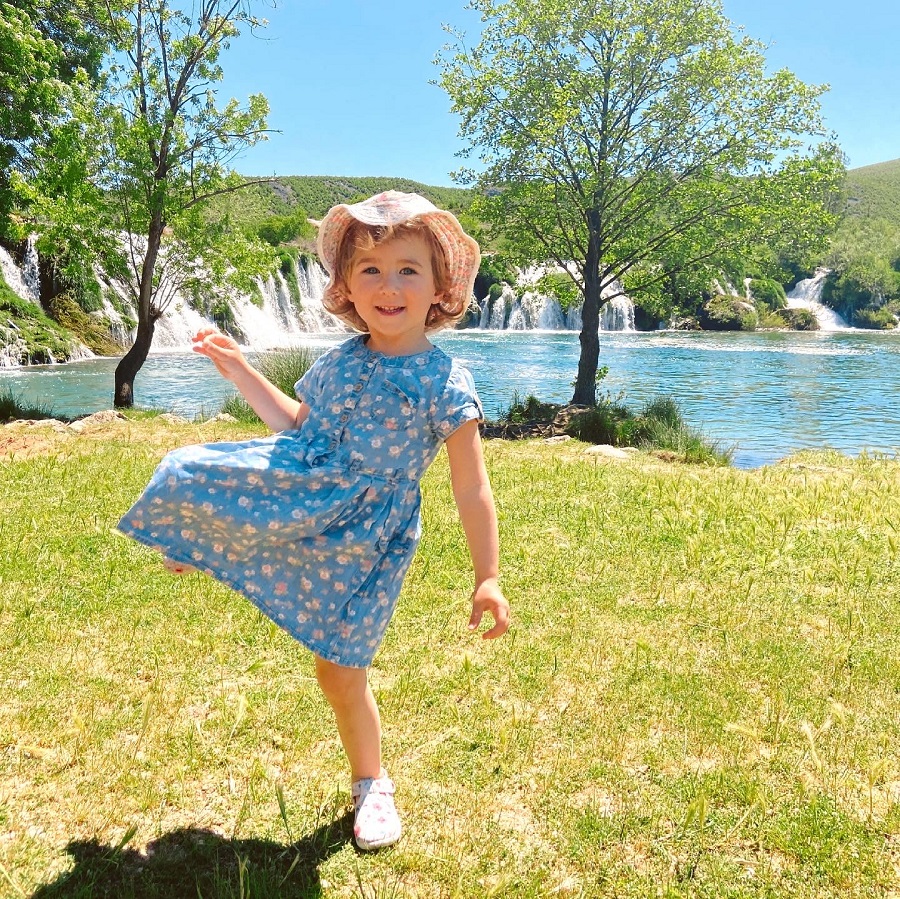
4. What were you most nervous about making the switch? What was your biggest fear, and what was the reality of what you found?
We made a move so quickly that it didn’t leave us much time to worry, but rather get things done! As a lovely add-on to the major life change we were about to encounter, 4 days before we left, I found out I was pregnant with my second child, surprise! I immediately began worrying about obtaining health care and what the hospitals are like in Croatia, and what my birthing experience would be like. After arriving in Croatia, I realized that my fear would soon become a reality. When I think about the bureaucracy here and having to get any sort of government paperwork done, the first word that comes to mind is NIGHTMARE. As I continue to meet other expats and even locals, I would say that is easily the biggest problem in Croatia. I cannot tell you how many times I stood in line pregnant and holding Zara for 3+ hours only to be told that they can’t help me and that some completely random and illogical paperwork or process was missing. I had so much anxiety every time I walked into a government building because I never knew what I would hear. That I missed a step in the process and can be issued a fine, that they will kick me out of the country if I don’t get my papers sorted before the deadline, or that I will not obtain public health care before I go into labor with my son. I quickly learned that Croatia is a very ”it’s all about who you know” kind of place. I got practically nowhere to obtain residency and health care on my own. Luckily my husband has many aunts, uncles, and cousins here that were willing to help. They showed up to the meetings with me, spoke on my behalf, showered the government workers with homemade olive oil and chocolates, name-dropped a few people, and VOILA, I was finally getting somewhere. As grateful I was to have those connections and finally have some progress, I was utterly shocked that this is how the system operated and felt deeply sad for the people moving here who didn’t have those connections.
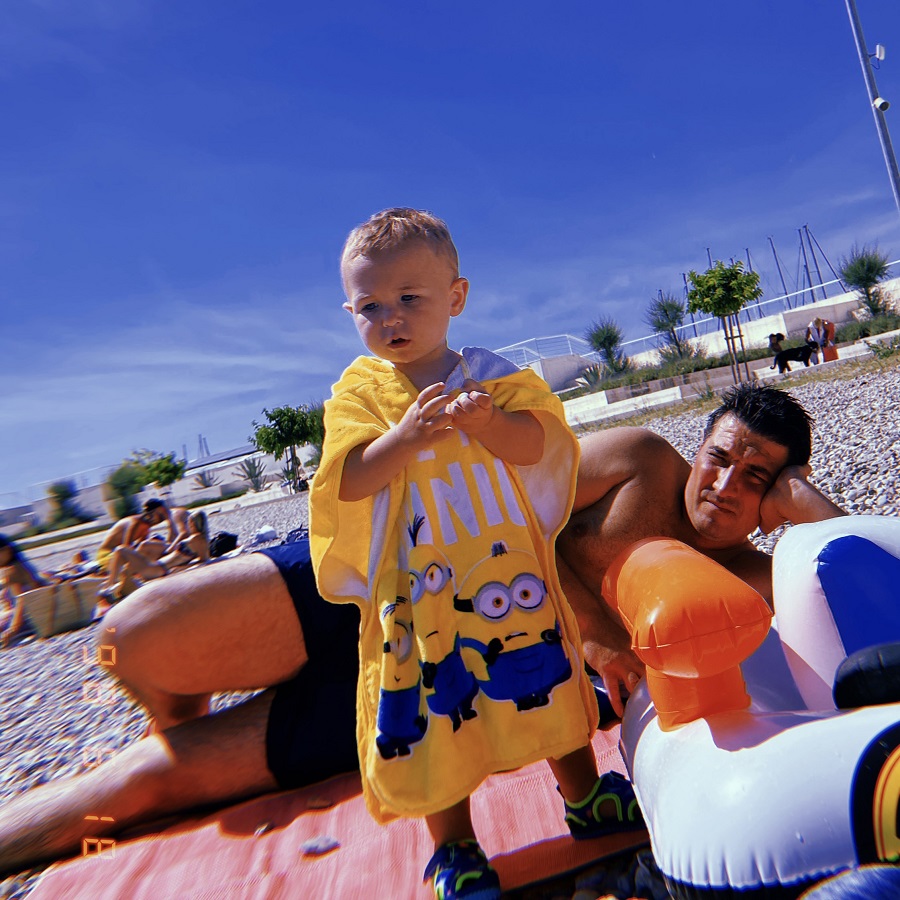
5. Think back to the time before you arrived. What were your perceptions about Croatia, and how were they different from the reality you encountered?
Naively, I had the perception that our return to the motherland would be celebrated by the locals. With the economy in Croatia suffering and many young people choosing to live and work elsewhere, I thought our young family coming to lay roots and contribute to Croatia would have been embraced. I must say there were some wonderful locals who were very proud of us, but the overall judgment, resentment, and outright mocking from the locals really shocked me. Just like many of the people back home, there were Croatian locals who were also laughing about us failing and returning home with our tails between our legs. Luckily for us, we have that stubborn Croatian blood and used that stubbornness to propel us into creating the reality we dreamed of!
6. You are still here, so obviously, the pros outweigh the cons. Tell us about some of the things that you love about being in Croatia, as well as some of the things you don't like.
The people of Croatia, just like the rest of the world, have been sold the ”American dream”. When they scratch their heads in question about why we would leave the ”land of opportunity” to move to a poor economic country, I would reassure them that their perception of North America is warped. Do not get me wrong; I am so grateful I was raised in Canada and was exposed to such an open-minded and multicultural environment. Although the Canada my parents moved to in the 80s and the Canada I lived in before leaving were two very different places. Josip and I grew tired of the 4 hours on the road everyday commuting, on dangerous winter roads, I might add, the ”it's never enough” greed that was sweeping our culture, the constant arguing over religion and politics, the unhealthy lifestyles we were leading, and the lack of social life. I was starting to feel ourselves, along with everyone else around us, turn into robots. We only had time for work, sleep, and repetition, and there was no spontaneity left in our lives. Paying your bills and keeping up with the Jones’ was taking over like a plague, and we were sick of it! Since moving to Croatia, our days feel longer, our lives sunnier, and our future brighter. They say Zadar has 300 sunny days a year, and that is exactly how I would describe our life here, sunny! Fewer hours a day spent in Toronto traffic means more time to cook a fresh homemade dinner, stop by a neighbor's house for a coffee, or our nightly walks through the stunning city of Zadar. People are so much more at the moment here; they smell the air, notice the wind, and indulge in the people in front of them. I have yet to be with someone and have them have their face on their cell phone or be in a daze worrying about work the next day. The magic of living in the moment is so evident here and is truly what Josip and I value the most.
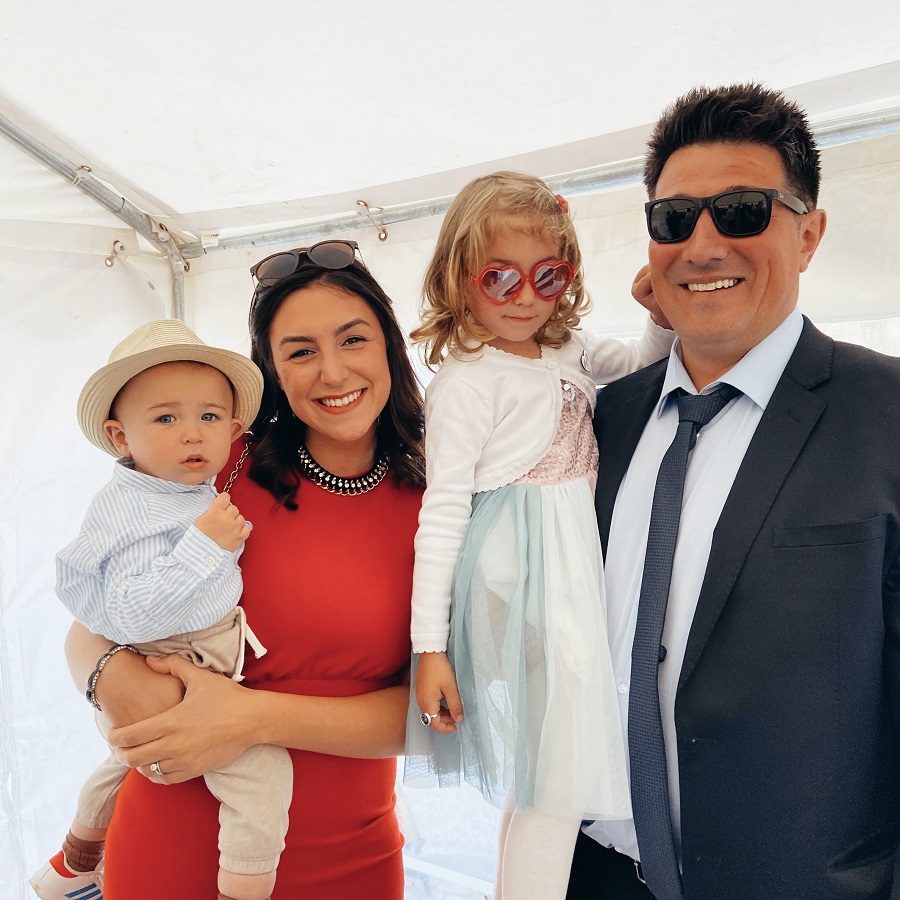
7. What advice do you have for others thinking about making a move from the diaspora?
I would first like to say that I believe true happiness comes from within. Whether where you are is ”heaven” or ”hell” is all based on your perception. If you have an open mind, a determined spirit, and a passion and love for Croatia, you can do it! There is a massive expat community here that is beyond welcoming and helpful and is a great support system for one another. Our dream of moving here was nagging at us for years, and finally answering the call for change has been the best decision we have ever made for our family. If you are seriously thinking of moving to Croatia, then there is clearly something pulling you to shake up your life a bit! There will definitely be moments where you might, in fact, feeling shaken. I have had moments of frustration and have felt homesick. In those moments, my husband, my children, and I go for a walk in Zadar, watching the most beautiful sunset in the world while the sea organs play and laughter and a sense of calm fill the air, and I immediately feel at peace again. My perception of my life in Croatia with my family is truly my idea of ”heaven on earth”.
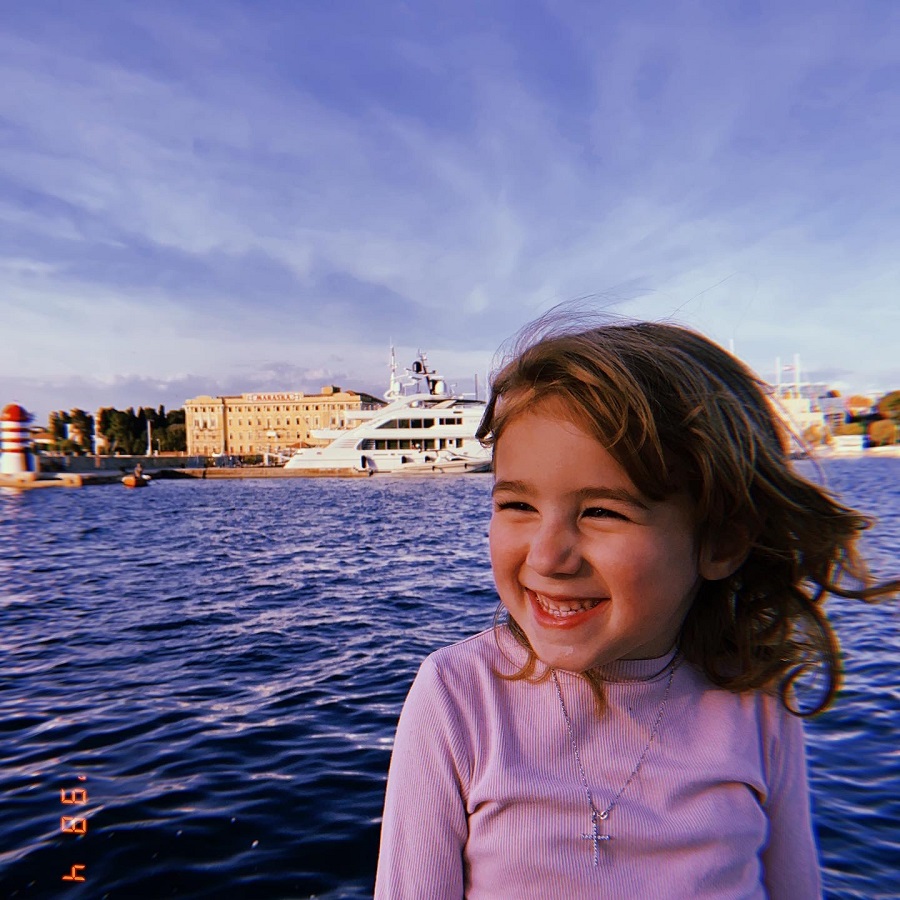
8. How do you think Croatia can better assist those who are looking to return to the Homeland?
People all around the world are discovering Croatia and understanding its beauty and the appeal of living here. I have no doubt that the expat community will continue to grow rapidly, and I would love to see them be more embraced here. The problem with the bureaucracy is not one I know how to fix, but it is by far the biggest hurdle people encounter when moving here. Perhaps more information and English-speaking assistance for newcomers would be a good start. As for the tainted mind of the locals and their hesitancy towards expats, I wish for them to understand that we love their country so much that we decided to give everything up to live there! I would love for them to receive us as a compliment and not as a threat. Croatia is a growing and quickly evolving country. I think we can find the balance of respecting its untouched and rooted energy while accepting the open-minded and positive energy we expats bring. Croatia is abundant, and there is enough of her beauty to sustain us all.
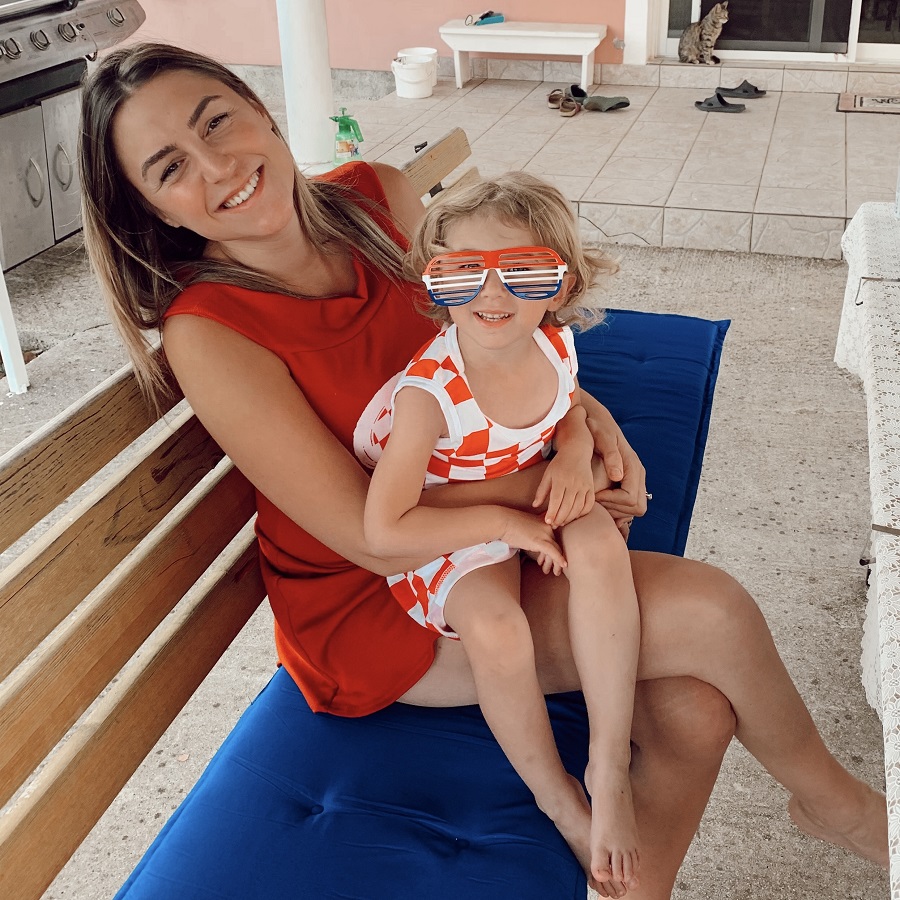
The sun is hot on our faces,
our skin becoming kissed.
The sound of birds, dogs and children,
I pinch myself to be sure I exist.
A woman is singing,
she plucks the strings of her guitar.
The old man in the hat watches her
as he smokes his cigar.
These walls have history,
many tales of victories and defeat.
My daughter dances on its ruins,
my son explores the cobblestone in his bare feet.
A castle that was fit for kings and queens
is surely fit for you and me.
Zadar as the backdrop of our story,
the cleansing from the deep blue sea.
My heart belongs to this city,
my family breathes its air.
I wouldn’t have it any other way,
God has answered my prayer.
- Katarina Bučić
****
Thanks, Katarina!
You can follow more stories in the Croatian Returnee Reflections series in our dedicated TCN section.
Would you like your returnee story - positive or negative - to be featured in this series? Contact This email address is being protected from spambots. You need JavaScript enabled to view it. Subject Returnee.
****
What's it like living in Croatia, and where can you get the best survival tips? TCN CEO Paul Bradbury and TCN Editor Lauren Simmonds have teamed up to publish Croatia, a Survival Kit for Foreigners.
Follow Paul Bradbury on LinkedIn.

1st October Weekend in Osijek Was Full of Life - Trust Us, Head On East
October 2, 2022 - Osijek is too much fun. The 4th largest city in Croatia and the regional centre of eastern Croatia lives the good life. The IT scene is booming, new things keep popping up, and cultural events are ever-present. The autumn months are especially exciting. During the day, you can still chill in the sun by the Drava, and in the evening, walk through one of Osijek's many parks, picking up wild chestnuts. Or you can enjoy them as a snack if you buy them roasted from the legendary carts. And on late September / early October weekends, now traditionally, you don't even need to ask what everyone is doing. Just Head On East.
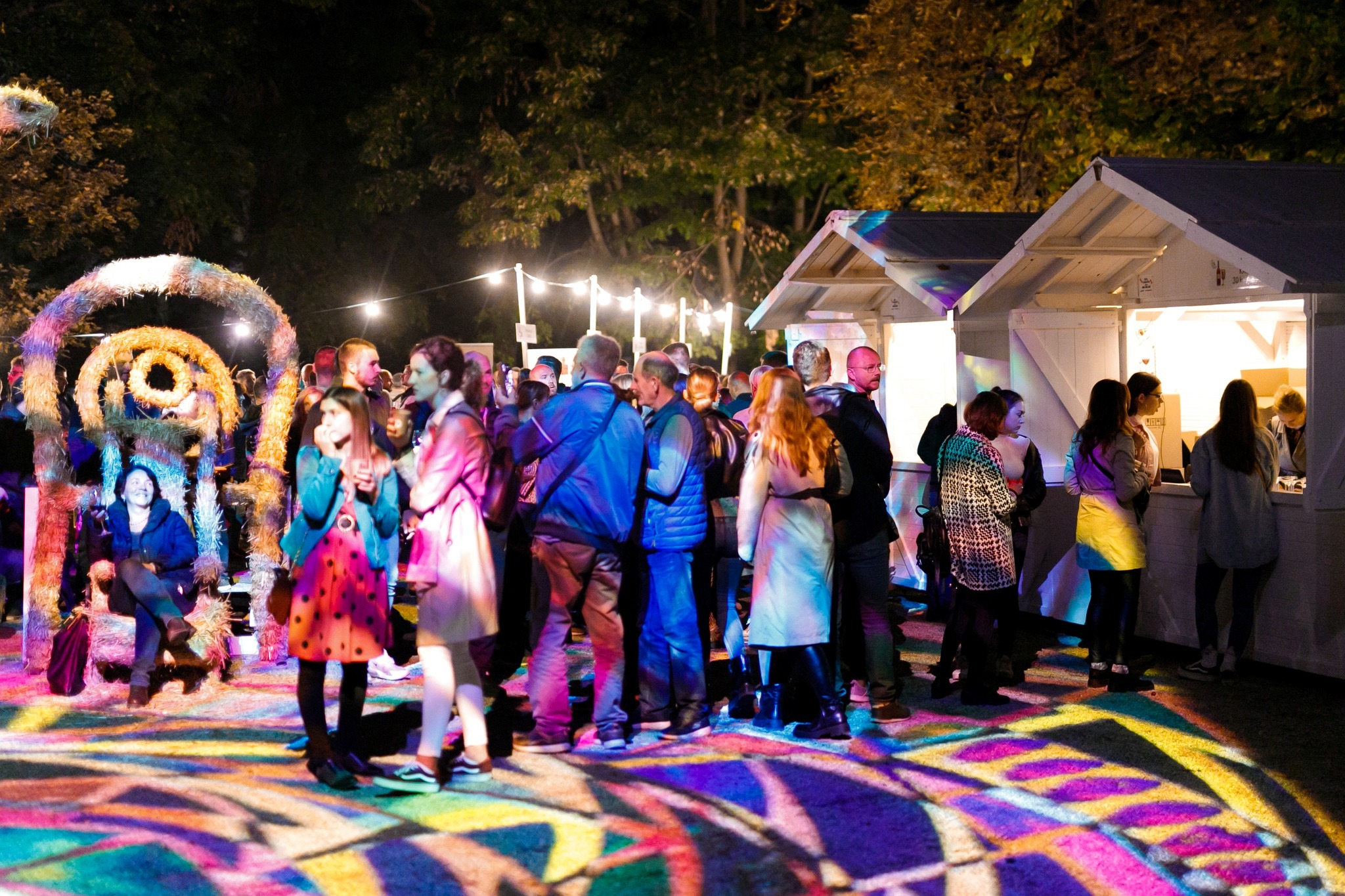
This festival, as the name suggests, celebrates hedonism in the east. And does it shine brightly here. The organisers included the Osijek-Baranja County Tourist Board, the Osijek-Baranja County, the City of Osijek, and many of the city's institutions - schools, libraries, museums, and associations. It felt like all of Osijek just came together to create an unforgettable experience. And we don't say that lightly.
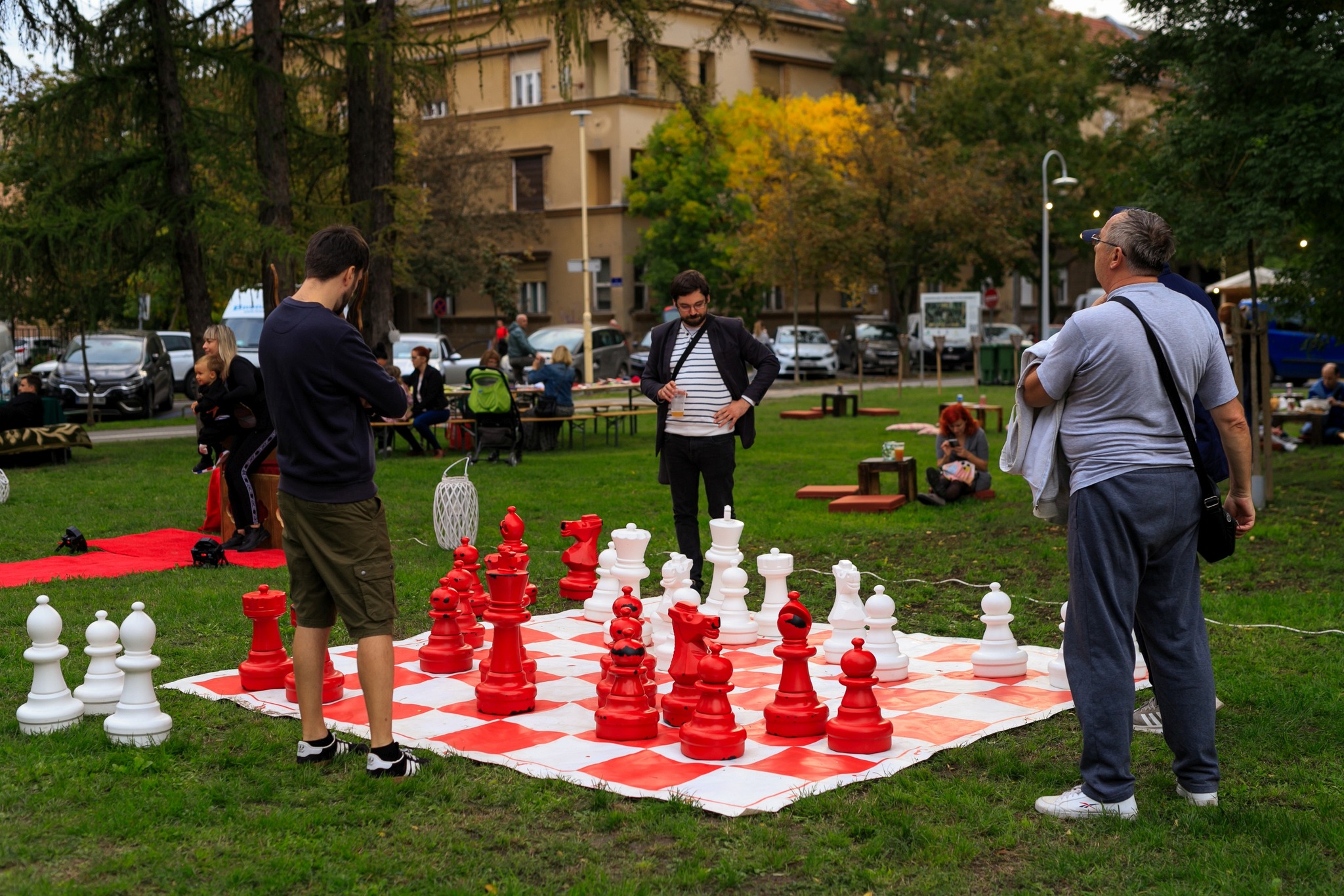
The organisers thought of everything and made sure to accommodate all ages and personal definitions of hedonism. Whether that is food, fine wine, beautiful art and light installations, or good music, you could spend the entire weekend living in Osijek's royal parks.
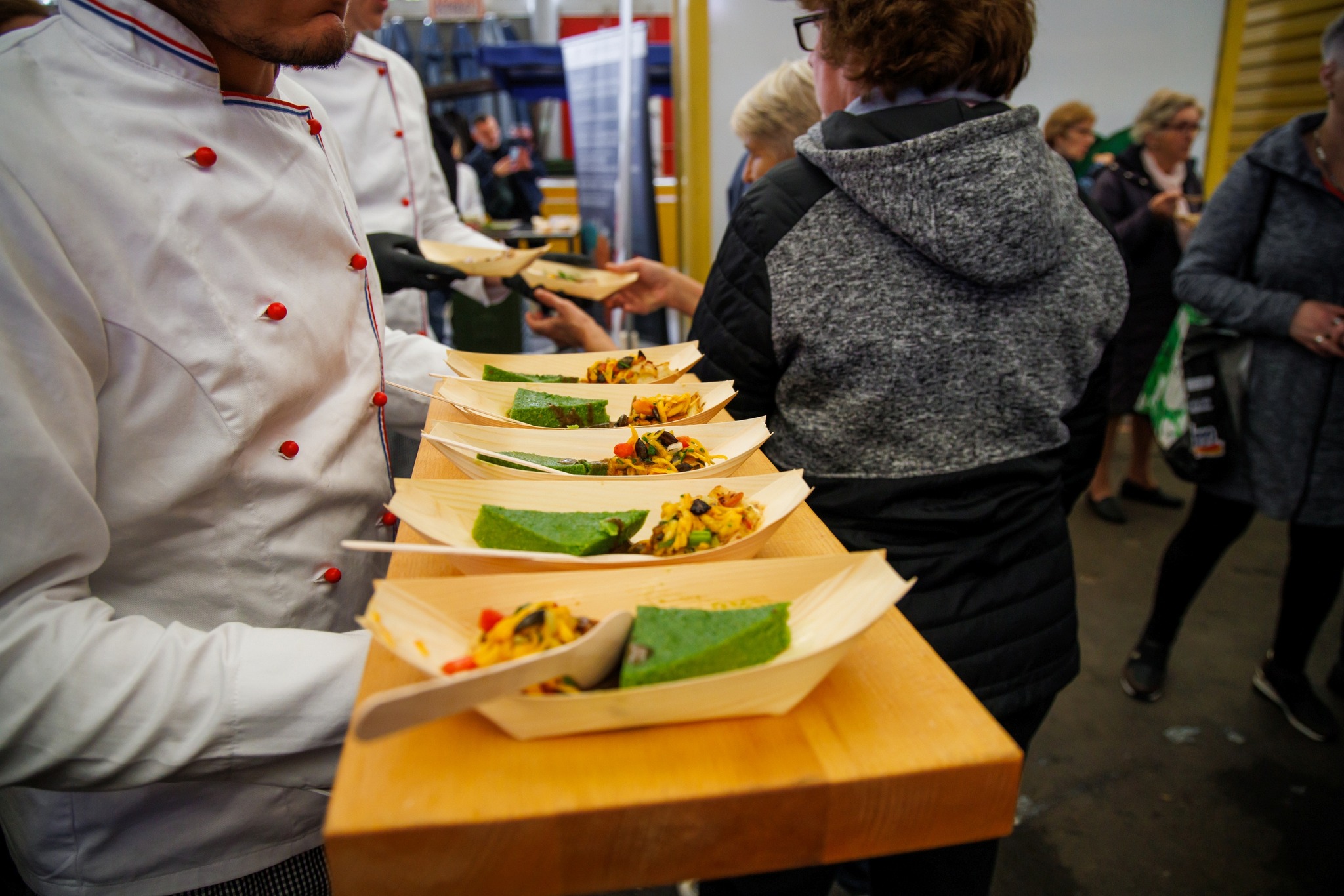
This year's theme was a royal one, with the main venues being the royal parks of Osijek, i.e., the parks carrying names of kings and queens. Our favourite was the one that hosted the Kingdom of Wine or KraljeVINA (wordplay in Croatian: Kraljevina = kingdom, and vina = of wine). Fun fact, with 17 parks (surpassing the number of squares), Osijek is known as the Green City or the City of Parks. And Head On East utilised that to create an atmosphere of warmth, familiarity, and joy, yet excitement for something new at every step.
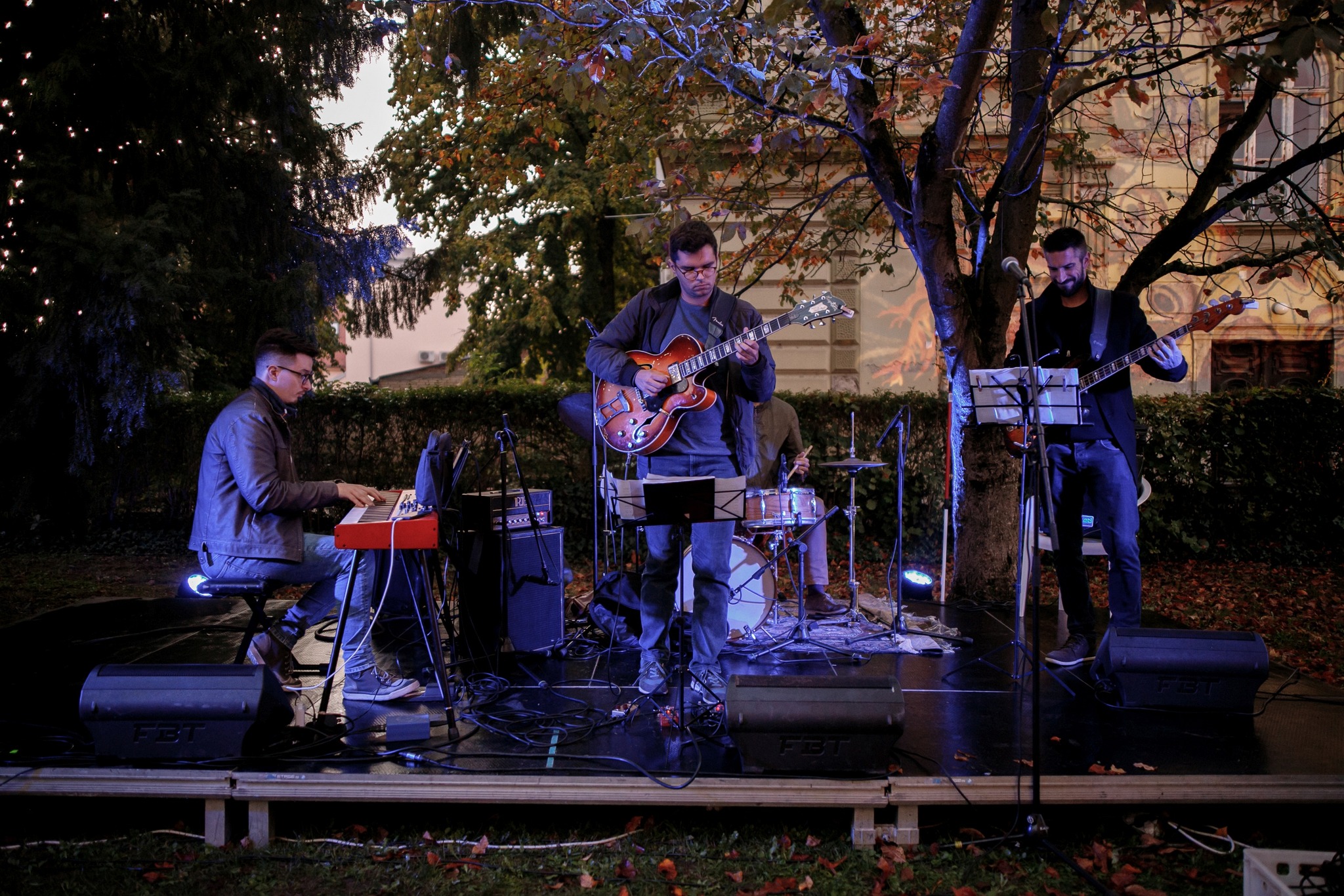
From early morning on Friday until late at night on Saturday, something was happening. Workshops and theatre for the little ones, cook-offs and culinary classes at the market, art, education, wine tasting, local food, craft beer and gin, and live concerts. What impressed us the most was the thoughtful planning and organisation of the locations and events, which made heading on east dynamic and entertaining in a way you wouldn't necessarily think about. The parks felt like a little kingdom each but were all connected by the central theme, hedonism. And though something else was happening at every location, and all the events and crowds made it busy, the route was logical and made it easy to enjoy every aspect.
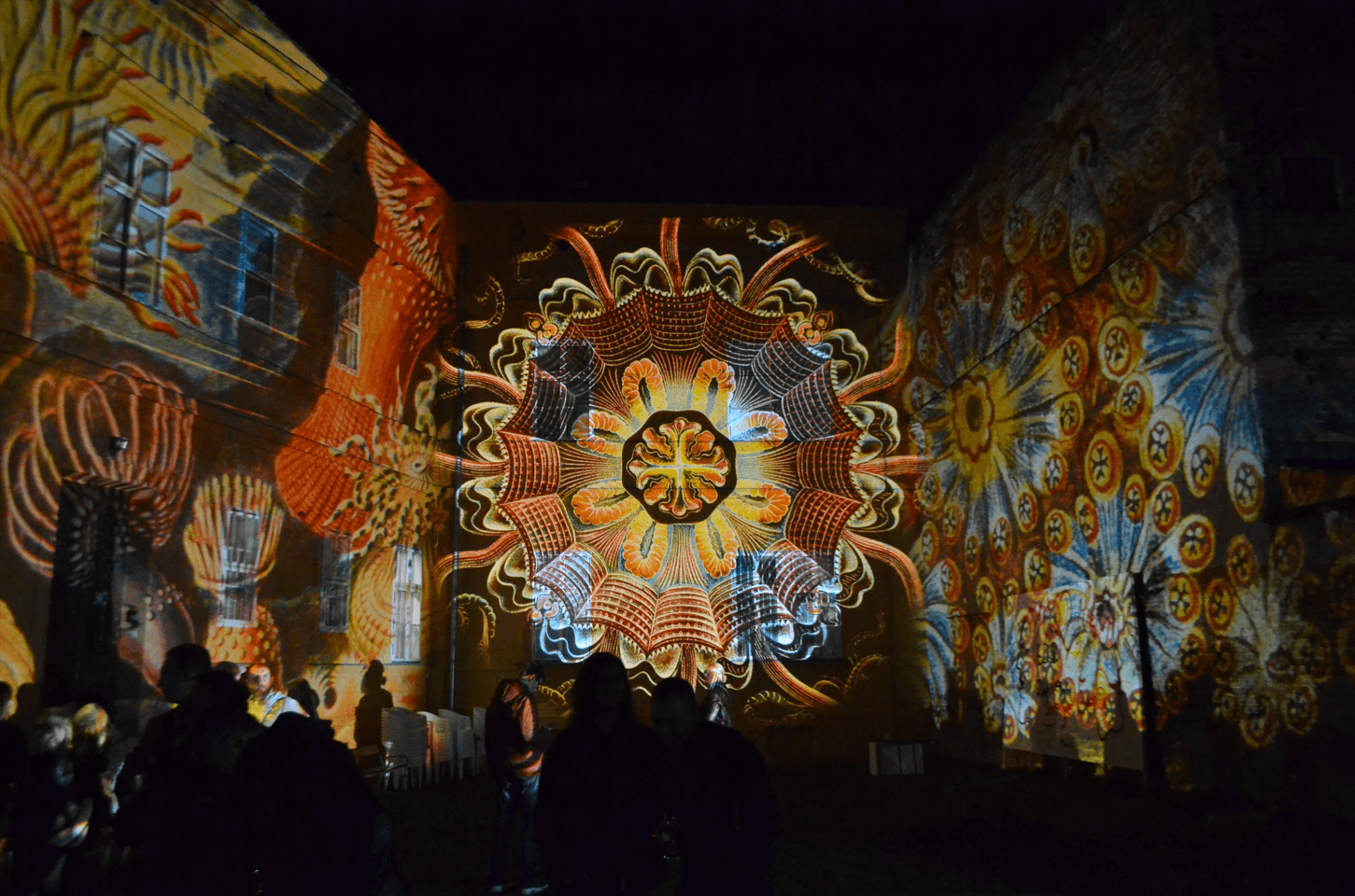
The light installations put up along European Avenue made the night simply magical. The fact that not only you could walk into the Museum of Fine Arts and look around while listening to a live jazz concert in its backyard but also try your hand at contributing to a painting while having a glass of local wine would probably make anyone suddenly start appreciating art that much more.
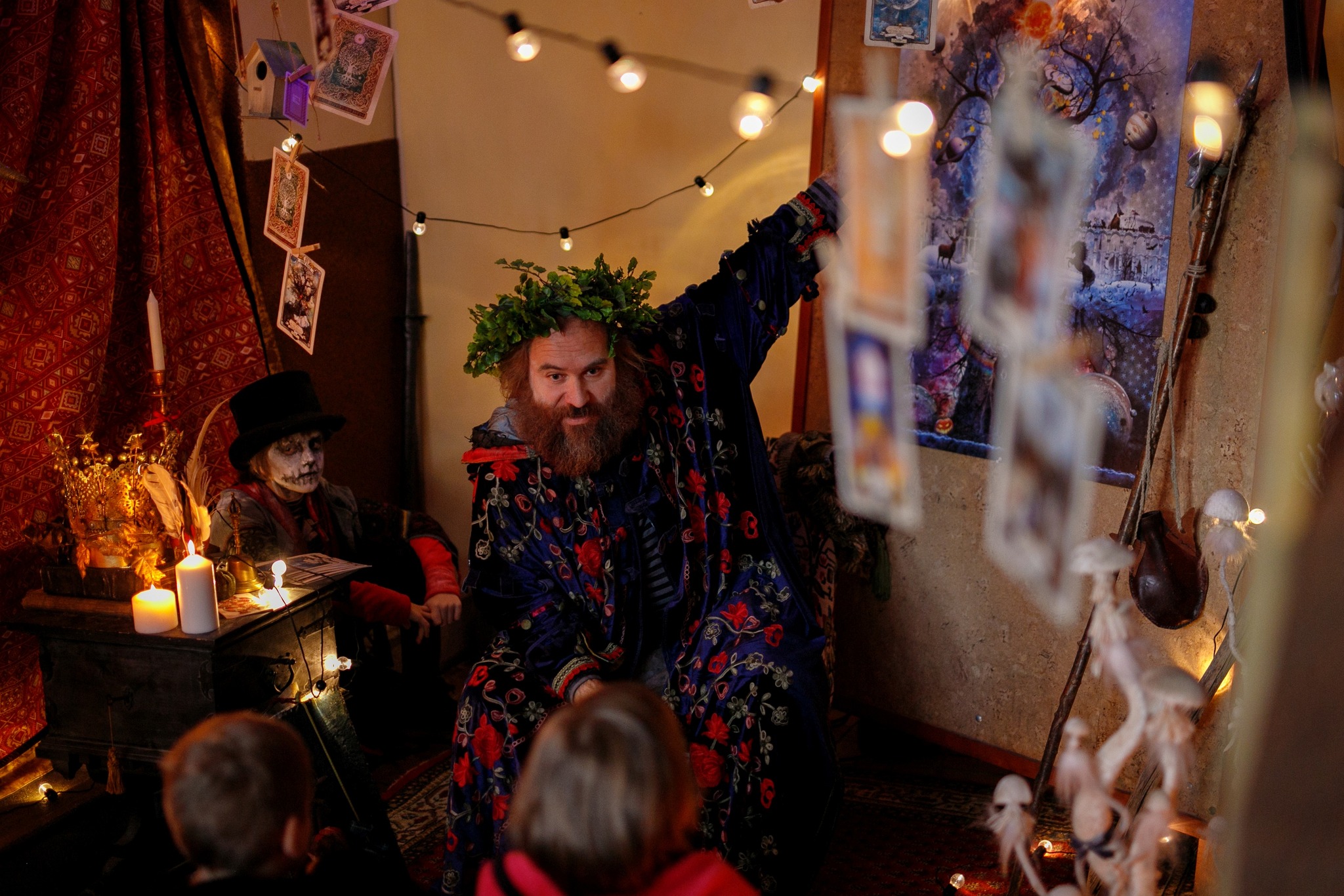
To quote Ivana Jurić, the director of Osijek-Baranja County Tourist Board, we invite you to come and experience the east of Croatia more. Head On East and discover what it's all about!
Photos are courtesy of Visit Slavonija Baranja Facebook page (Marko Banić / Osijek-Baranja County Archive).
For more, make sure to check out our dedicated Travel section.
Dutchman Arrives in Dubrovnik in Search of Father from 1967 Romance
October 2, 2022 - A Dutchman has arrived in Dubrovnik in search of his father, a waiter back in 1967, the result of a holiday romance.
Every day is an education in this beautiful county, and life is never dull with the TCN inbox.
A week ago, I received an email from Holland from a man who was planning to come to Dubrovnik to look for his father, whose holiday romance with his Dutch mother over 50 years ago bought him into the world. I published Looking for My Dad, a 1967 Hotel Bellevue Dubrovnik Waiter and was then offline for most of the day.
When I got back to work, I found my inbox was flooded with emails, possible leads, demands for money, and the story all over the Croatian media. TV channels wanting to interview the son. There were offers of help from private detectives, retired policemen, and many others, including several demanding money for information.
I was sent links and photos, and there were four possibles in four different countries - Croatia, Serbia, Montenegro, and ironically - the Netherlands. Stefan, the son, was encouraged but did not have any special insights from the photos. As another lead came in from a fifth county - Bosnia and Hercegovina - I realised that there was no way I could follow all this up with my limited time and resources, so I messaged a friend with whom i had worked last year identifying the mystery woman on Krk with no memory.
And so I hand the story over the fabulous Laura Siprak of 24Sata, who has been in contact with Stefan and doing quite a lot of research into all the leads. Here is the first of Laura's stories on the search, which appeared last night in 24Sata.
It was 1967, Nettie was 26 years old then. She came from the Netherlands to Dubrovnik on vacation with a friend and stayed at the Komodor Hotel. There she met the fatal waiter Gojko Smiljanić, whom she met a year earlier at the Bellevue Hotel, where he worked. Then she rejected him, but the second summer she agreed to go with him. They started a short romance and from it Stefan Brouwers, now 55 years old, was born. His mother is now 81 years old.
- She realized she was pregnant with me when she returned to the Netherlands. Then she worked as a gymnast in the town of Breda. She wrote to Hotel Bellevue and Komodor to tell Gojko that she was pregnant and to contact her by letter, but she never received an answer. She didn't get married and I'm her only son - recounts Stefan, who first contacted the Total Croatia News portal.
Until recently, he worked as a Dutch teacher and school counselor, but now he has slowed down and works in a bookstore.
He and his wife arrived in Dubrovnik so that he could try to find his father.
- My husband doesn't really look like his family. He has their ears, but not the rest: he has a smaller build, is thinner and tougher, has darker hair and skin, is hairier than them on his arms and legs, has bushy eyebrows and a beard, has been wearing glasses for a long time, and they don't. The colour of the eyes is also different, his are brown, while in the family they are blue. He also has high cheekbones, which no one else in the family has. I believe he picked it up from his father - his wife explains.
Stefan has one son, and he would like his son to meet his grandfather and be in his life, even if he was not already in Stefan's.
- My mother told me about my father for the first time when I was about to become a father. Then she also gave me this blurry picture. She doesn't really want to talk about it, as if she's ashamed. You know, strict Catholic upbringing - he explains.
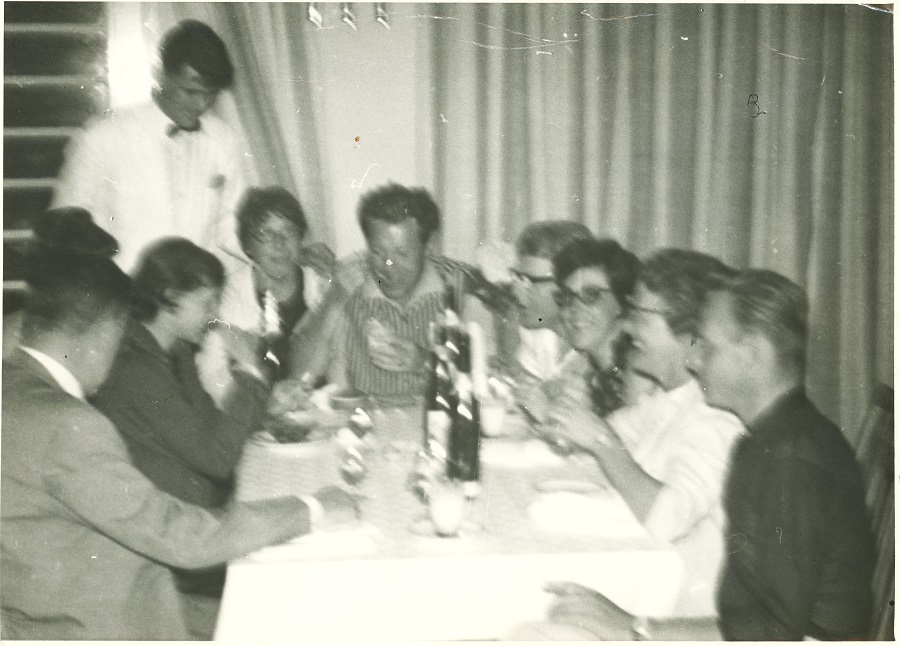
Her family helped her raise Stefan and they are very close, but he would like to know who his father is.
- I also talked to her friends who were with her, but they couldn't help me, they didn't talk about it. Mother didn't want to, I don't think she was ready. Periodically, I extract from her what she remembers, after all, she is now advancing in years. I told her I was going to Dubrovnik, so she opened up a little - she says.
He himself sent enquiries to the hotels, but never received an answer.
- Of course, his name is important. This is where the confusion arises. He never wrote his name, so I only know of: Gojko Smilonić from my mother. I couldn't find anyone with that name, the best existing names that look like that are Smiljanić or Smilović. If he is still alive, he would have to be eighty years old. I have his 'foggy' photo - he said.
His father is a man in a white jacket and white shirt with a bow tie standing on the left. His head is slightly bent, so it is harder to make out his face. He communicated with Nettie in German because he did not speak English.
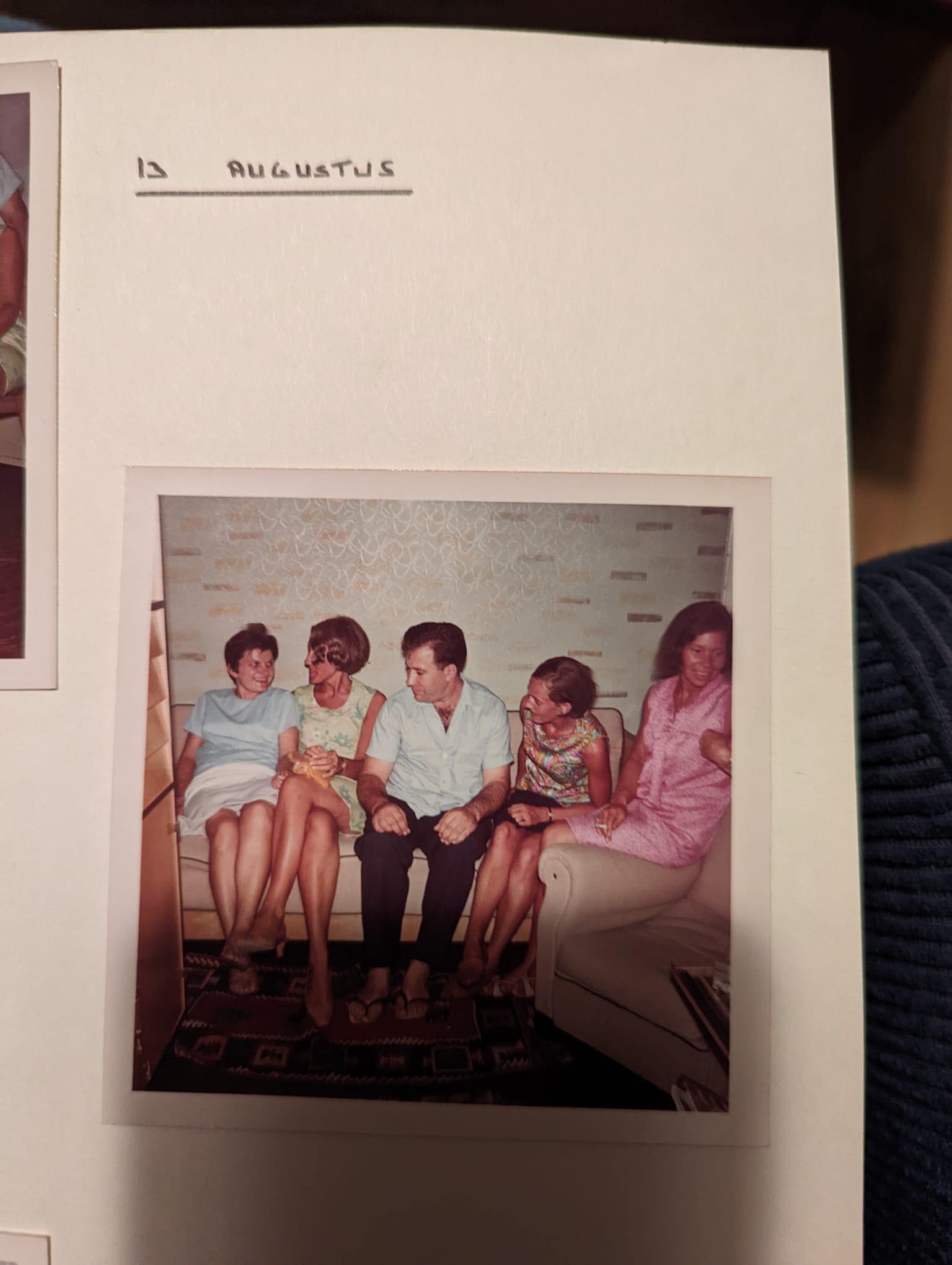
But there are more photos of the mother from that summer vacation. She is fourth from the left, and she is accompanied by Lucija, who was a cleaner at the hotel, her husband and two other women. They were photographed in August 1967.
We asked people who worked in hotels at that time and are still alive, and even though they don't remember him, all three of them pointed out an important thing: without tourism and hotel management education, Gojko could not have been a waiter, so the assumption was that he was educated for that, either in Makarska, Ploče, Montenegro or somewhere else on the Adriatic.
- My mother told me that Gojko wanted to train as a chef when he was working as a waiter. She fell in love with him, she says he was wonderful to her - says Stefan.
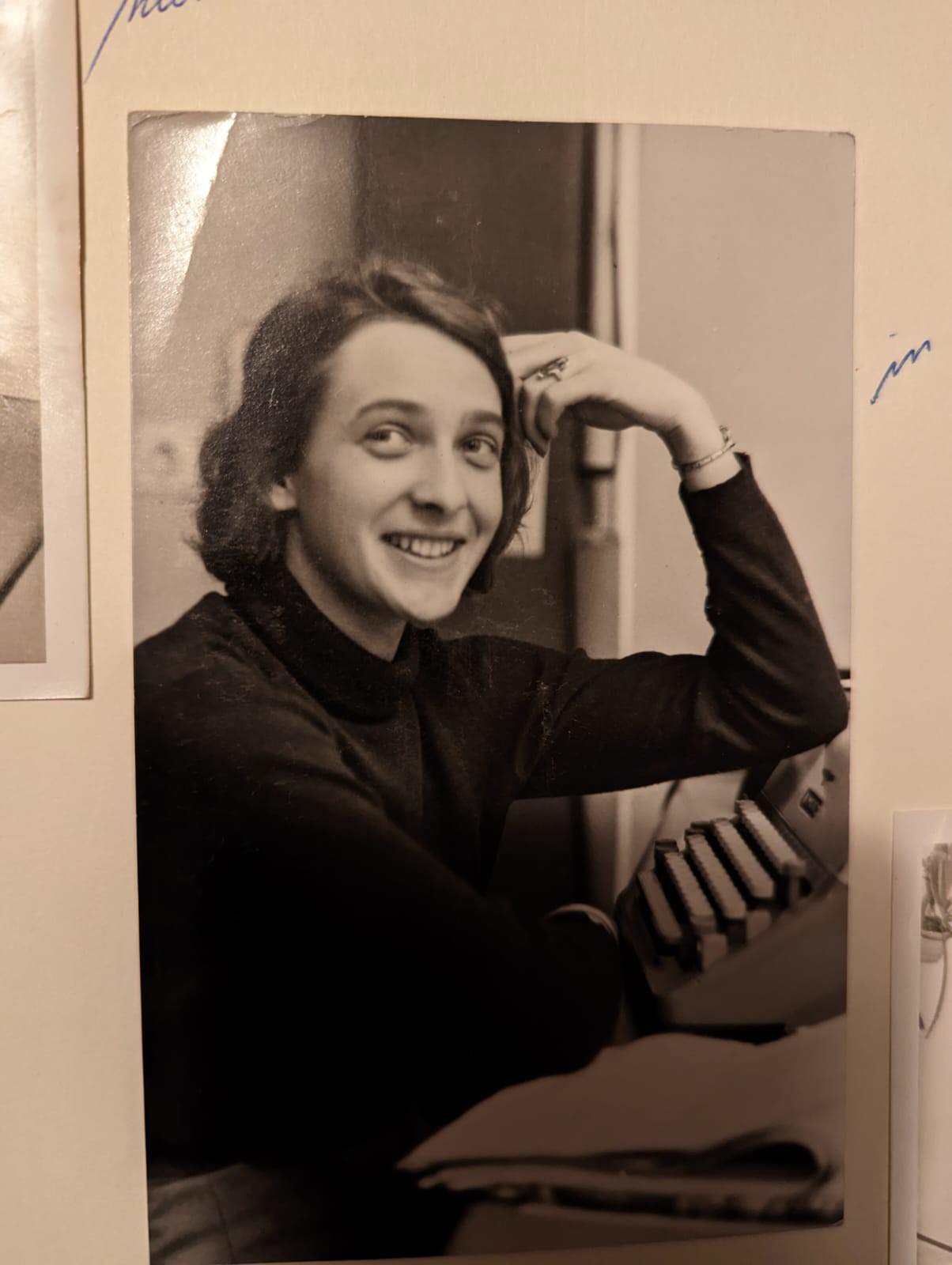
Gojko should be in his 80s today, and Stefan obviously inherited a lot from him. Since he first contacted Total Croatia News, several people have contacted him with possible clues. What we have managed to find out so far is that his father is not Gojko Smiljanić from Majske Poljane, nor the owner of the same name from 'Eldorado steak house' from the Netherlands. Stefan will be in Dubrovnik for the next two weeks. He is asking anyone who might know his father, the cleaner Lucija, her husband or have any other useful clue to contact This email address is being protected from spambots. You need JavaScript enabled to view it. with the title "Dubrovnik waiter" or the 24sata newsroom. Call us at 01/ 24 24 242 or send your materials via MMS to 099/224-2424. We use the same number for Viber and WhatsApp messages. In addition, you can contact us at This email address is being protected from spambots. You need JavaScript enabled to view it., via www.facebook.com/24sata, via Twitter at @24sata_HR or via the application on the page https://www.24sata.hr.
Croatian Returnee Reflections: Mikki Hall, from UK to Osijek
October 2, 2022 - Whisper it quietly, but more and more people are relocating to Croatia from the diaspora. In a new TCN series, we meet them to find out how they are faring and what advice they have for others thinking of making the switch. Next up is Mikki Hall, who moved from the UK to Osijek.
Mikki Hall is an experienced Customer Experience Consultant whose strategic marketing experience has seen her work across industries and organisations around the world. In addition to her busy corporate career, Mikki also worked as a property developer and a freelance interior designer in the UK.
In 2020 she chose to return home to Croatia, where she was born, and has now turned her knowledge of strategy and logistics, as well as her passion and flair for interior design, into a new venture.
Following her own property development experience, Mikki has set up her own business mirabellgroup.com. She is particularly passionate about sustainable development and property renovation. Mikki aims to help clients visualise the design of their property, find top-quality tradespeople and manage interior design projects to bring them to fruition.
Here she explains why she feels those moving to or returning to Croatia have both unique opportunities and challenges to navigate and how she can help.
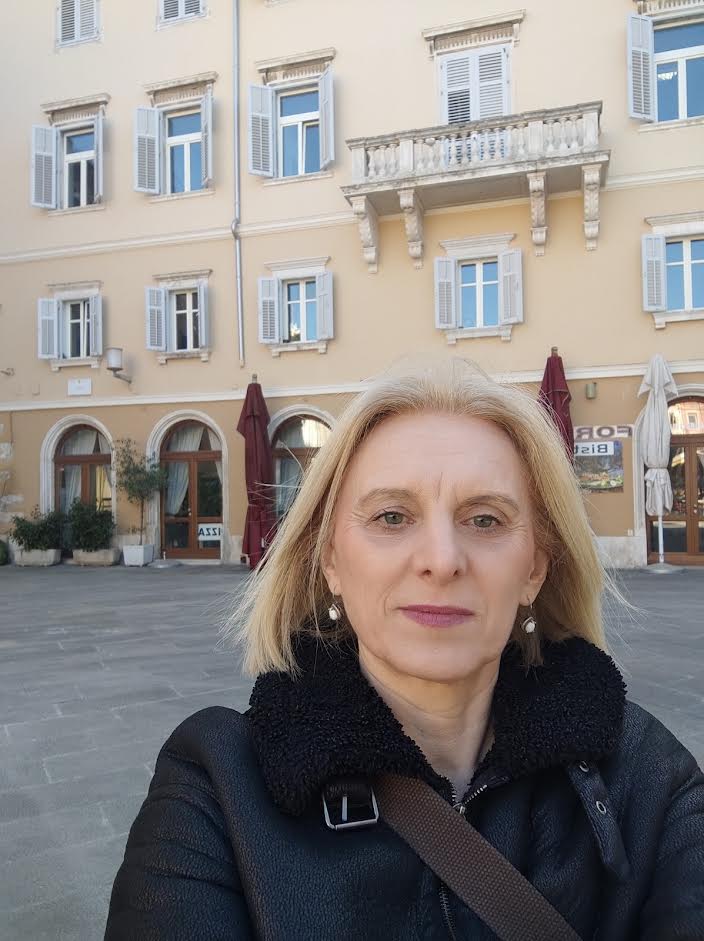
1. You made the switch to Croatia. Tell us a little about the decision process and how long it took for you to get on the plane.
The decision process was interesting. My husband and I always planned to come back to Croatia at some point, but to some extent, the decision was made for us because two things happened - the Covid pandemic and Brexit.
During the pandemic, we didn’t like the way things were being handled in England and preferred the approach that Croatia was taking. There was a sense of community and cohesiveness that made us feel safer here. I remember seeing a picture of traders at a local, open-air market repurposing Christmas huts two metres apart so people could come and buy locally produced food and queue safely. So different to our regular queuing outside ASDA for hours. It was creative and warm, and it was a reminder of our values and how we want to live.
Brexit was the other event that made us determined to come home. We arrived in September and applied for the EU Settlement Scheme under the withdrawal agreement initially. Even though I’m a Croatian national, it was the easiest way to go about things for my husband, who is British.
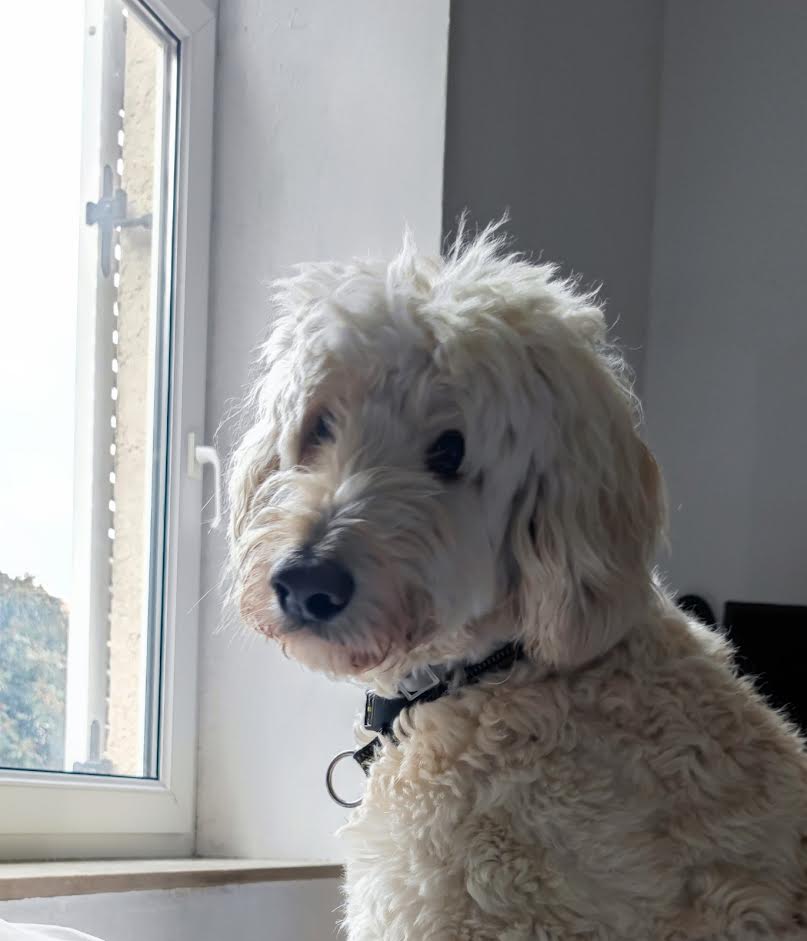
2. What did your family and community back home think of your decision at the time?
They thought we were mad and were very clear that they felt it was the wrong thing to do - that we would be better off staying in the UK. They felt that although I had been born in Croatia, I was more British in my behaviour and they worried that it would be hard to settle back in. While there are definitely challenges when you have lived abroad for a long time, ultimately, we're delighted to be back.
I think it helps that I speak the local language. David and I have made many friends in Croatia because of our wonderful dog Buddy, often the only labradoodle in town.
Renovating the house has been particularly helpful because it’s enabled me to get involved with the local community as I went about finding good local tradespeople. What has been less easy is dealing with local bureaucracy.
I think Croatia has so much to offer people who want to come and live here, so the process has made me want to support others doing the same. One way I feel I can do that is by sharing the knowledge I have gained and helping them to find the people they need to create their homes here.
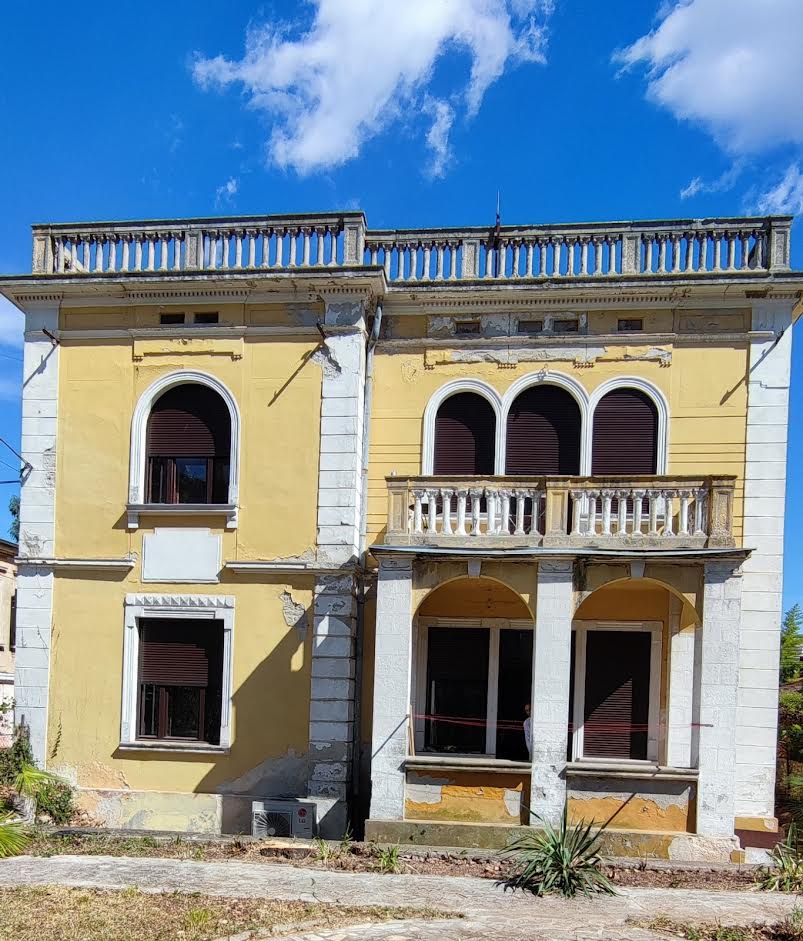
For example, if you know where to look, there are some fantastic ways to redesign your home sustainably; I have upcycled reclaimed parquet flooring which was going to go to waste. I have also spoken to so many people who couldn’t believe the cost of wallpaper in Croatia - what costs £20 in the UK is €75 here - so knowing where to find things is extremely helpful for settling in and feeling established here.
3. Where did you get your information about the realities of Croatia prior to coming?
That's where it really helped having been born here - I was able to get some information from my friends and family but funnily enough I also got a lot from Total Croatian News as I had been following it for the last couple of years. It felt like an English voice reporting local news and information far more accurately than the newspapers.
It is tricky for the diaspora - those who have lived abroad and want to come back - as there isn't a lot of cohesive, practical information available. I ended up reading everything in two languages and then when we went to the MUP (Ministry of the Interior) to register I found myself having to show them what the rules said. For example, it was hard getting a like-for-like driving licence. The local office actually said thank you after we had to do it all again post-Brexit - I think they found it as confusing as we did.
4. What were you most nervous about making the switch? What was your biggest fear, and how was the reality of what you found?
I think I was mainly worried about integrating and adapting back to local ways. It was important to me that we became part of the community and didn’t just continue living a UK life in Croatia. You have to make the effort and it takes time to acclimatise and to be fully accepted as part of the community.
5. Think back to the time before you arrived. What were your perceptions about Croatia and how were they different from the reality you encountered?
My perception about Croatia has always been that it’s a fantastic, vibrant place to live with a great lifestyle and a lot of opportunities. That perspective remains true - even more so now that we’re here. However, I think that a lot of people don’t realise how much potential is here - especially younger people who have perhaps left for jobs overseas.
I think with the rising cost of living across Europe, now is a great time for people to return and apply all the skills they have learned abroad. We need young people with a can-do attitude. Only the other day, I heard a mother saying her son has gone to Ireland and is working at KFC, a fast-food restaurant paying minimum wage. I am sure skilled young people could have much better opportunities in Croatia.
Croatia is a beautiful country in all ways - the nature, the mentality of people - but I think it has far more to offer people in their careers as well as their lives than perhaps they think from the outside.
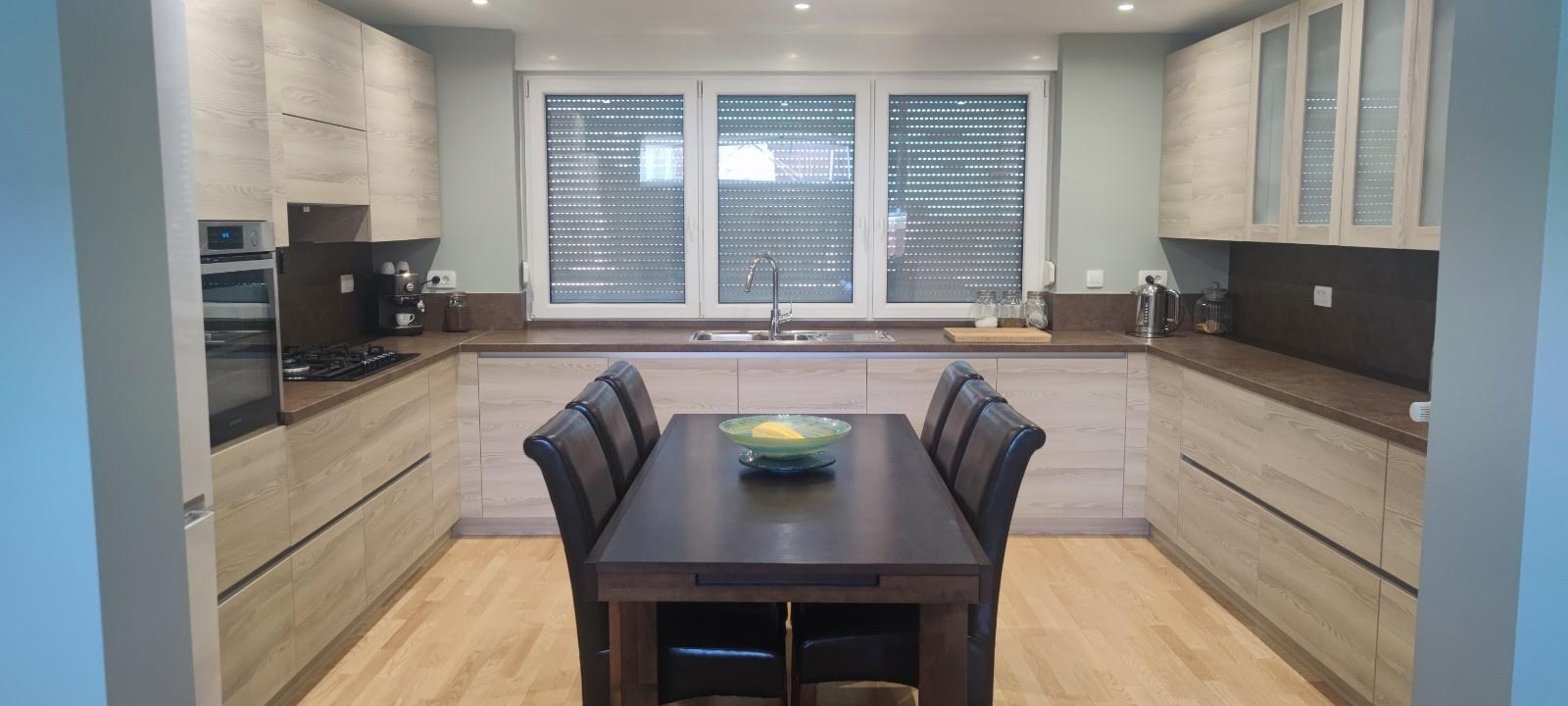
6. You are still here, so obviously the pros outweigh the cons. Tell us about some of the things that you love about being in Croatia, as well as some of the things you don't like.
I love the people, the culture, the nature and that I can be on the coast one day and amongst the vineyards the next. There’s so much going on in the country, which is nice. What I have found challenging is finding the right tradespeople for different jobs. I don’t think that’s unique to Croatia - I think it’s hard to find people you can trust and work well within any country and context, especially when it comes to building work and maintenance. Cost of materials and furnishings is also a lot more expensive here than in the UK, and this can not be explained just by with VAT difference or because Croatia is a smaller market.
However, I do think it is a little bit harder when you move to a new place. Again, it definitely helps that I speak the language, and I am mindful that anyone coming here without speaking it has another hurdle to settling in; that’s where I think I can really help.
7. What advice do you have for others thinking about making the move from the diaspora?
My advice for people looking to make the move would definitely be to do it but to gather as much information as possible first. If you have people here who you can talk to and help you settle, then seek their advice. If you speak the language or have someone you trust who speaks the language, that’s a definite advantage. My main piece of advice, however, would be to embrace it - Croatia is a fantastic place to live and offers superb work/life balance.
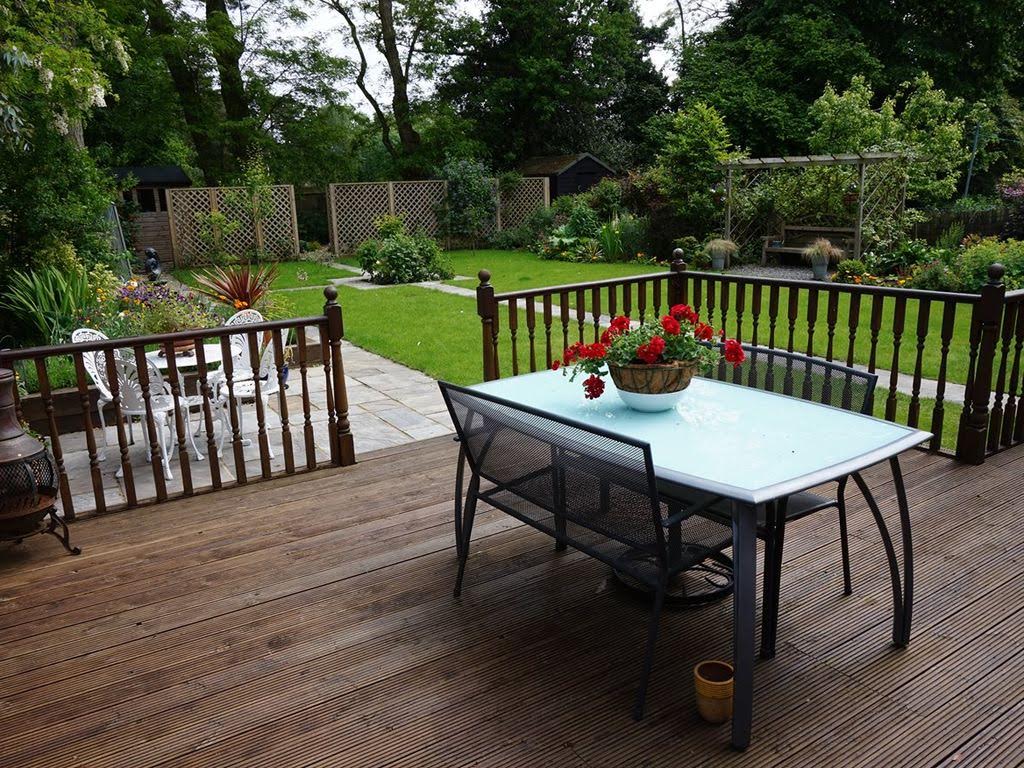
8. How do you think Croatia can better assist those who are looking to return to the Homeland?
I think that there's a definite need for more of an information gateway, and it would be great for the government to tap into the diaspora and encourage them to come back and invest in local businesses. Those of us who do it, do it because we want to, but if we had more support, we could do it better and create more of a commercial impact for the country.
My full name is Mirjana Berecic-Hall, but in the UK, everyone calls me Mikki Hall. I am married to David Hall and have a wonderful dog called Buddy.
We have two homes, one in Osijek, which we have just finished renovating and one in Pula
Follow us on Instagram and Facebook @croatianadventure
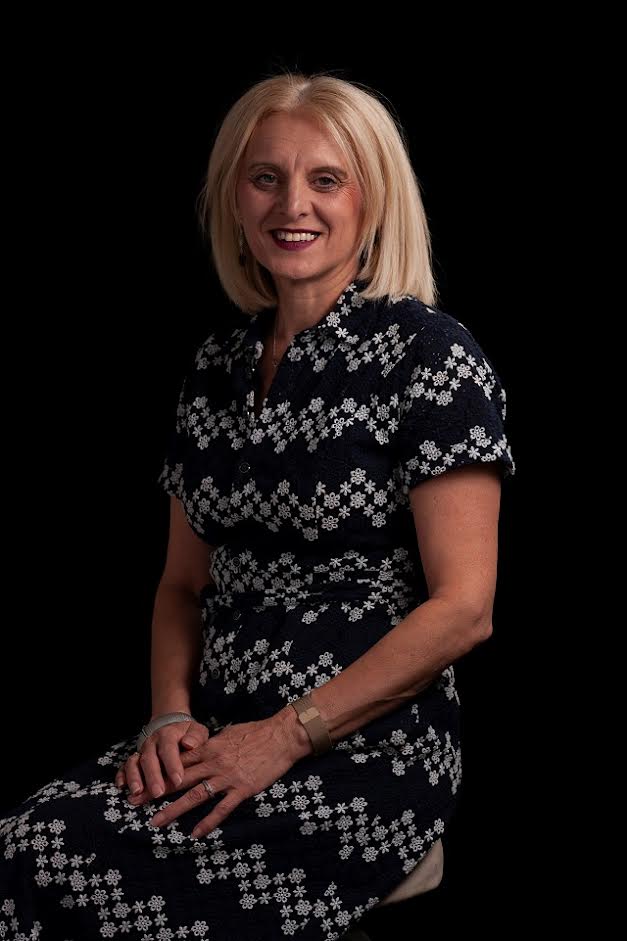
****
Thanks, Mikki!
You can follow more stories in the Croatian Returnee Reflections series in our dedicated TCN section.
Would you like your returnee story - positive or negative - to be featured in this series? Contact This email address is being protected from spambots. You need JavaScript enabled to view it. Subject Returnee.
****
What's it like living in Croatia, and where can you get the best survival tips? TCN CEO Paul Bradbury and TCN Editor Lauren Simmonds have teamed up to publish Croatia, a Survival Kit for Foreigners.
Follow Paul Bradbury on LinkedIn.



